#hazbin hotel meta
Text
I noticed some interesting symbolism.
You see how at the end of his musical number Angel worryingly wipes the "poison" that is dripping from his mouth right...?
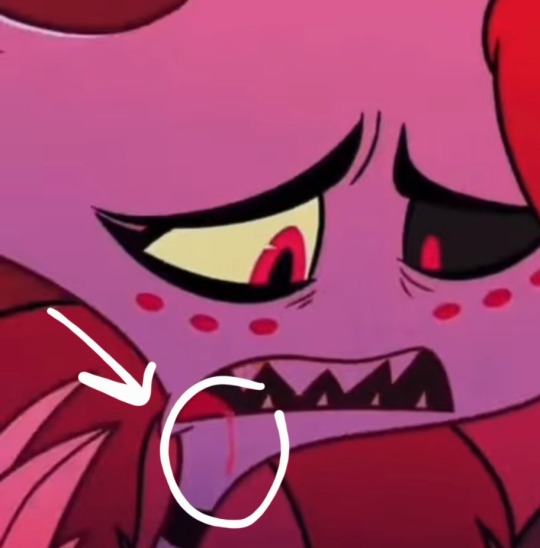
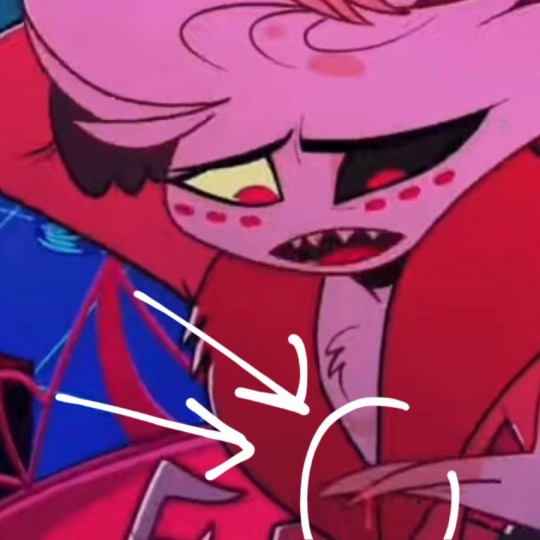
Well, what do we see next..?

Yeah...Vox and Angel may not be that different when it comes to their relationship with Valentino
#hazbin hotel#hazbin hotel vees#vox#valentino#angel dust#hazbin hotel theory#hazbin hotel meta#hazbin#staticmoth#hazbin hotel vox#hazbin hotel valentino#hazbin hotel angel dust#hazbin hotel poison
5K notes
·
View notes
Text
i think it’s really funny how many people say that alastor is ace, not aroace, just because viv has only called him ace.
love you guys but you are GRAPHICALLY overestimating people’s knowledge on aromanticism and asexuality and how they are different. they have been confused with each other since their existence, and just because someone is queer doesn’t mean they’re incapable of confusing the terms or using them interchangeably. alastor is clearly shown to not have romantic feelings, just take a look at some of the official jokes.
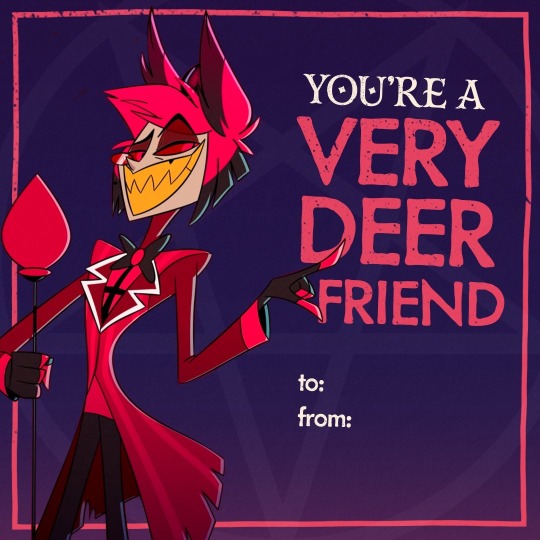
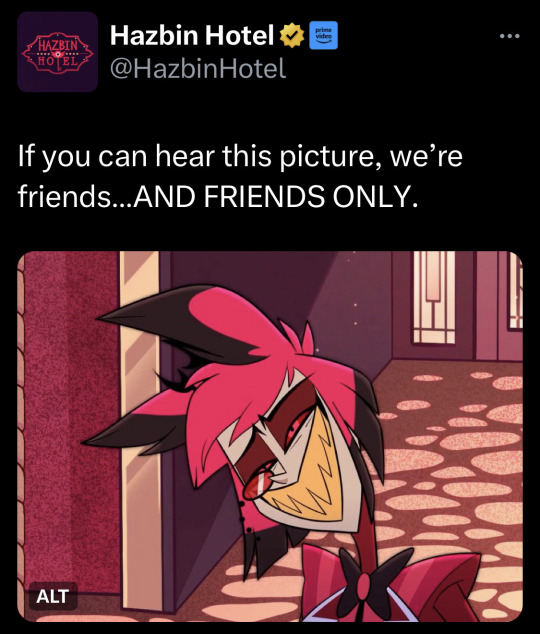
both of these are explicitly non-romantic. not just non-sexual, they are both jokes and comments about being aromantic, not asexual.
yes, rosie only mentions him being asexual in episode seven, but again, this is a joke made about the idea of him being in a ROMANTIC relationship. unless rosie was implying that she knows alastor and charlie wouldn’t fuck? which 😭😭 i don’t think she would do that??? it was definitely a joke about him not wanting romance because of his romantic and sexual orientation. and yes, i understand how annoying it is that asexuality and aromanticism are being used interchangeable in this instance, and this is an issue ace/aro people have been facing for years, but this is clearly a joke about him being aroace, not just ace.
again, you guys are giving alloromantic/allosexual people WAY too much credit on how much they know about ace/aro people, when most of their knowledge (if any) is “asexual people dont want sex, aromantic people don’t want romance” and that’s it. vivziepop, despite being queer herself, is still allo as far as im aware. allo people BARELY know anything about asexuality or aromanticism or care to learn the difference, and it’s clear that aro/aceness is being used interchangeably here. alastor is portrayed as aroace, and is clearly meant to be seen as aroace, even though he’s only ever been explicitly called ace by viv.
#this isnt even mentioning that his va called him aroace and viv never corrected him lol#(in front of her i might add)#hazbin hotel#hazbin hotel alastor#hazbin alastor#alastor the radio demon#asexual#aromantic#aroace#aroace alastor#aromantic alastor#asexual alastor#hazbin hotel meta#hazbin meta
565 notes
·
View notes
Text
Vox’s Rivalry with Alastor: Need for Control
The whole thing with Vox is control. He’s the embodiment of modern technology and surveillance. The privacy issues we face? In Hell that’s all Vox. And when you think of it like that his whole rivalry with Alastor makes so much sense on a logical level.
Things Vox Controls:
-The public: constant surveillance, brainwashing, and further control over media content they consume. He doesn’t just control what people watch but he watches people.
-This partners (to a degree): we see this with how he interacts with Valentino. He isn’t the one in CHARGE, but the thing with Valentino is he tends to be very explosive, and Vox is able to direct the blast in a direction that won’t harm him (offers to bring up employees for Val to kill so he won’t make a public display about Angel)
-Himself: We see how he puts so much energy on to be publicity ready and have a smile on his face. Talking very much like a businessman or politician. He acts completely different in front of camera.
Even his smile. Both Vox and Alastor use smiling as a mechanism to hide their true selves. But with Alastor it works as a way to keep people guessing, to inspire a level of fear oftentimes.
Vox isn’t like that. He puts on a fake, plastic smile. Alastor tries to make himself off putting on purpose, Vox doesn’t. He does it to keep them complacent. Alastor smiles so people won’t figure him out. Vox smiles so people trust him enough not to try.
We see that the second Alastor is brought up that smile vanishes. His self control is gone. Throughout the song we see him lose more control over his public persona, getting more visibly angry, while at the same time the public turns more to Alastor. Meanwhile Alastor also butters his partners up and publicly announces to the world that “no, Vox can’t control me. Trust me, he tried.”
Every single thing Vox controls is threatened when Alastor is involved. Vox has no way to control him.
-Methods he uses on the public? Surveillance and media? Won’t work because Alastor can’t be captured on camera well and hates modern technology. Brainwashing the public? Won’t work if they’re paying more attention to Alastor than him.
-His partners? Alastor declined his partnership and is willing to poke at the relationship between the Vees. All the Vees carry some weight in the relationship, but Alastor could make Vox seem obsolete. He’s able to control their public perception, yes- but one of them could easily go rogue and blow that to bits.
-Himself? Demolished. Gone. He has a public breakdown. He glitches out. Fully cries at the end of the song. Maybe it’s the fear of what Alastor could do, maybe it’s their past, maybe it’s Vox’s weird hate boner, maybe it’s unrequited feelings. Who knows. All logic and control goes out the window when Alastor is involved.
And the thing Alastor seems very much the same. He hates being under someone’s leash. He needs to be in control. When he’s reminded he’s not he lashes out. The first time we really see their masks break is when they’re reminded of the fact there is someone out there that is a threat to the control the have. The “What did you say?” they both do before lashing out.
I’m interested in seeing how they’ll interact in the future. Because they really do seem like two sides of the same coin. The only difference is we know who Vox is afraid of, we don’t fully know who Alastor is of yet. They need power over others, but more than that they need power over themselves. (Alastor being controlled by whatever the deal he made was. While Vox is controlled by his emotions towards Alastor. And both being controlled by their fear.)
( @gabrielsbubblegumbitch I’m curious on your thoughts? I’ve read some of your analyses 1’s would love feedback.)
#hazbin hotel#hazbin hotel meta#hazbin hotel analysis#hazbin hotel vox#hazbin vox#vox hazbin hotel#alastor hazbin hotel#alastor#radio demon hazbin hotel#staticradio#radiostatic#one sided
709 notes
·
View notes
Text
I really want the show to go into more detail about Husk's backstory as an overlord, partly because I feel like it's something the fandom is kinda glossing over and partly because it's lowkey one of the biggest obstacles that a Husk/Angel relationship would have into overcome.
'Loser Baby' emphasises the similarities between Angel and Husk's situations, but it also (probably deliberately, since Husk is the one leading it) brushes aside one of the most major differences between them.
Namely that when Husk tells Angel that he's not the only one who sold his soul, he's not just singing about himself.
Husk sold his soul to Alastor, yeah (or lost it at least, which amounts to the same thing), but he also traded in souls. He was that “psychopathic freak”, and was operating fro long enough to achieve Overlord status.
And, honestly? Having your soul owned by Husker back in the day probably sucked.
The one benefit of soul contracts for the person selling their soul is that they seem to get a fair amount of say in how the contract is written.
Angel's contract, for example, apparently has a clause stating that he's only under Valentino's jurisdiction when he's in the studio. (Which, btw, puts a whole other spin on why Val is so pissed when he moves out of studio accommodation and into the Hotel.) And Val is apparently bound to that. Even though he's pissed off and actively wants to put Angel in his place, he can't make any moves against him in the club.
Equally, since most overlords seem to be associated with a specific location/industry, you can generally choose who your working for and therefore roughly what kind of stuff you're gonna be doing.
In practice there seems to be a lot of manipulation and coercion going on on the part of the Overlords making these contracts— they're not fair by any means— but the sinners signing them are theoretically at least guaranteed the right to a (somewhat) informed choice and some control over the deals they make.
Having an Overlord who uses human souls to pay his gambling debts, however, completely undermines all that.
Imagine going into work for your job running the roulette games at the casino only to be told that the boss played a bad hand in a game with Valentino, and so you're a sex worker now.
Or being traded to someone who has you fighting turf wars for them, and realising that your contract doesn't have any clauses to protect your personal safety because you only signed up to be a bartender.
Or selling your soul for a job near your home and family so you can guarantee their protection, only to be traded to someone whose territory is on the other side of the pentagram.
Husk is a victim of his own addiction, yeah, which is one of the reasons why Angel relates to him. But his backstory implies that there must be a significant number of people out there who were also victims of Husk's addiction, and may not be as sympathetic. Dude basically owned other people as property (… we have a word for that) and then literally played games with their lives.
And like, I'm not saying he hasn't changed. He seems more empathetic on the show than his backstory would imply, and apart from anything else, he's had a pretty clear object lesson about what it's like to be on the receiving end of that sort of thing. (Ngl, I'm pretty sure one of the reasons Alastor keeps him around is because he's the type to find the irony amusing.)
But like, he's in this place where he can relate to Angel Dust's situation, while at the same time probably also being able to relate to Valentino and Alastor's perspectives (although I doubt he was quite as bad as Val to work for).
And I'm curious as to what would happen, later in the series, if the gang met someone who had sold their soul to Husk at one point. Someone who would also be able to relate to Angel's situation, but with Husk as their version of Valentino.
#hazbin hotel#angel dust#husker#huskerdust#meta#hazbin hotel meta#yeah i just got thru watching this series and I have Thoughts#alastor hazbin hotel#hazbin hotel headcanons#valentino#hazbin hotel spoilers
523 notes
·
View notes
Note
Hi! Where do you think Alastor's arc is going? Redemption or villainy?
Hi!
Thank you for the ask, I loved watching Hazbin Hotel and I am happy I can write for the series :)
As for now, I think Alastor will spiral and hurt Charlie very badly, but he will eventually redeem himself (probably in a key moment). That is because Alastor is framed as Charlie's Jungian shadow.
What is the Jungian Shadow?
According to Jung, the shadow is what a person represses, both positive and negative. So, it can be one's violent tendencies, but also one's potential and energy. It really depends on the person.
So, why does Alastor fit the Shadow Archetype? Well, first of all:
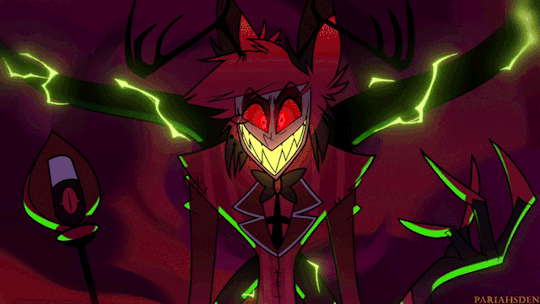
Alastor's powers make use of shadows. Not only that, but Alastor's own shadow is very expressive and shows the demon's repressed feelings. In other words:
On the one hand Alastor embodies the shadow, in the sense he represents what Charlie refuses to face
On the other hand Alastor himself represses his emotions behind a smiling face:
Alastor: Just because you see a smile, don't think you know what is going on underneath. A smile is a valuable tool, my dear. It inspires your friends, keeps your enemies guessing and ensures tha no matter what comes your way, you're the one in control.
This is a good characterization for a jungian shadow because the shadow grows stronger and more dangerous, when it's ignored. So, the most one refuses to face their feelings, the most these feelings fester and grow powerful and dangerous. This fits Alastor both when it comes to others and to his own character:
He takes advantage of an emotional unstable and vulnerable Charlie to strike an abimguous deal with her. Similarly, he uses Husk's gambling addiction to steal his soul. He uses people's weaknesses an unsolved problems to take over.
He suffocates his feelings, which symbolically manifest in his powerful shadow-tentacles. His design and abilities are representative of his psychological coping mechanism, which is nothing, but repression.
As written above, though, the Jungian Shadow can be both negative and positive depending on what one hides. This duality is shown in Alastor's two roles in Charlie's arc:
He is a demonic archetype (even moreso than Lucifer, the titular devil), as he waits in the shadows for a chance to manipulate Charlie
He is an evil mentor, as he genuinelly likes Charlie, sees her potential and wants to guide her towards greatness:
She's filled with potential that I could guide
This isn't a contradiction, but complexity. Alastor is chaotic and mixes negative traits and intentions with positive ones. Just like what people repress can be both bad and good, usually at the same time.
This is clear when it comes to the Princess of Hell:

Charlie to Alastor: What's that you said about smiles?
Charlie is similar to Alastor in how she represses herself behind her pollyanna persona and her smile. This doesn't mean she is faking her altruism and generosity, but that she is using these traits to hide something else:
Lute: The only reason you're still here is that Daddy gave you and your Hellborn-kind a pardon from an exorcist's blade. How does that feel? To know how little you matter.
Deep down, Charlie invests herself in the Hazbin Hotel project because she wants to matter. She feels powerless and unimportant, as a result of her parents' neglects and of Hell's difficult situation.
So, our protagonist has strong self-issues that she refuses to face:
Husk: Princess is a bleedy heart who wants to solve everybod else's problems, 'cept her own.
That said, this isn't the only thing Charlie represses. The Princess of Hell hides:
Every negative emotions she feels, like her self-hate or her anger at Vaggie for hiding her true identity:
Rosie: How does that make you feel?
Charlie: Just... angry? Because we share everything! Because she always supported me, and my ideas, and now I don't know whether or not that was just more of the lies... Oh no, that's a horrible thing to think! Do I think that? Yes! No? Kinda?
Her most violent and aggressive side, which makes so she is unable to make full use of her powers:
Vaggie: Well, I mean... You're the princess of Hell, but you don't really use the power that comes with that. Mybe you can, I don't know? Command a little more... authority.
Charlie: But that's so mean.
In short, by repressing her negative feelings, she also represses her potential. It is only by facing herself as a whole, that she can fully grow and bloom into her most powerful and complete self:
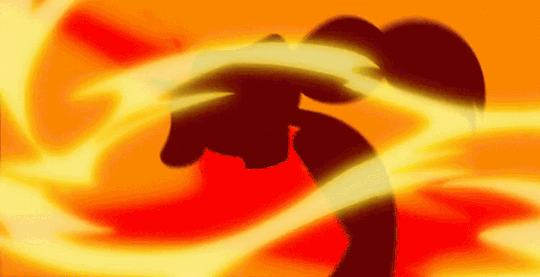
This is made clear in Charlie's quest in Cannibal Town. There, our girl is at her lowest, but she is pushing herself forward for the sake of her loved ones. She is trying to imitate Alastor by smiling, even if she is sour inside. However, things do not go well and it is only through her heart to heart chat with Rosie, that Charlie is able to pull herself together and inspire her people. Symbolically, she gets through them not with a 100% optimistic song like "Inside of every demon is a rainbow". Rather she opens her speech, by showing vulnerability and honesty:
It's a feeling like a rumbling in your gut
That you could finally be faced with
A billion needy faces
I guess what I mean to say is
For the first time in my life
I might have to be ready for this
Ready to be the one who's leading from the front
Gotta come into my own
Gotta come into my throne
Gotta take charge and defend my only home
And although I kinda feel unsteady
Now I need to be ready for this
She affirms who she is and her willingness to grow into herself:
For the first time in my life
Maybe I can be ready for this
I can be the marshal leading the parade
I can come into my own
And I think I've always known
My destiny could never be postponed
When Adam brings the battle here
I must appear like I'm ready for this
So, it is only by tapping into her own shadow that Charlie can be successfull. It is through expression and not repression that she can reach her goals.
What about Alastor?
He is the same, but so far he has been refusing to open up to others:
Angel: He's been here a while and he's still a big, creepy mystery.
That said, his time at the Hazbin Hotel has had an impact on him. He is forced to deal with others without killing them:
Vaggie: Pentious's eggs are all over the place. I need you to get rid of them. (...) Humanely!
He is shown cutting ties with a poisonous friend:
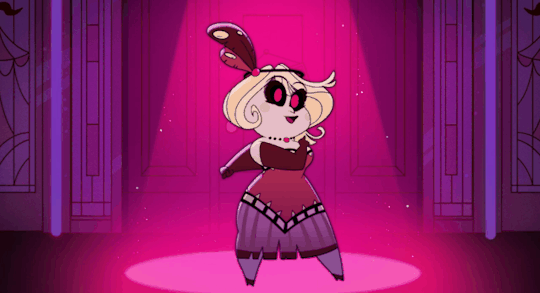
He openly admits he likes the people of the hotel:
Alastor: Ah, an enjoyable collective to be around. I admit one could get accustomed.
However, he still refuses to openly show vulnerability and ends up like this:
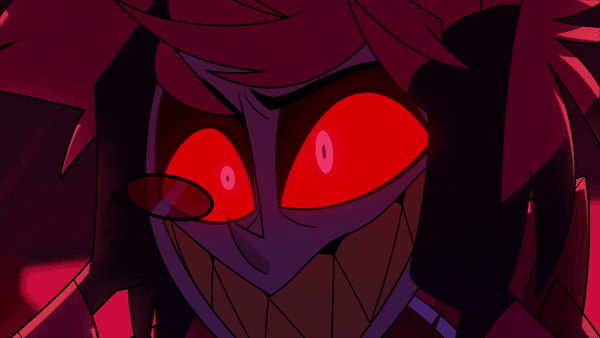
Let's highlight that Charlie and Alastor are foiled in The Show Must Go On song.
Both stand in the ruins of their homes/dreams.
The Hotel:
I took a hotel, and I destroyed it
I know I could have done better
Better, instead of letting you down
The Radio Station:
This place reeks of death
There's a chill in the air
And I barely escaped being killed by a hair
And both decide not to give up and to keep pursuing their objectives. However, Charlie is framed positively, while Alastor negatively. Why?
Charlie sings about her feelings openly and is supported by her father and found family:
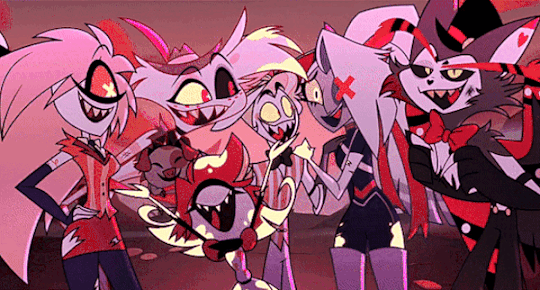
Alastor sings about his pain privately and even then he barely shows his desperation before going back to his villanious mask:

Symbolically the moment Alastor reunites with the Hotel Crew, he sings:
And we're doing it with a smile!
He is back in control of himself, ready to hide everything behind his neverchanging smile.
So, Alastor is both Charlie's negative foil and Jungian Shadow. As her negative foil, he is bound to spiral. As her Jungian Shadow he is bound to be saved. Why is that so? Two reasons.
The Jungian Shadow can't be killed, but needs to be integrated with.
The main themes of the series are redemption and love, so it is improbable that Charlie won't help the person, who co-founded the hotel with her.
If anything, it seems that our princess is progressively asked to forgive, inspire and see the good in more and more complex cases.
It starts with Angel, who willingly stays at the Hotel. It goes on with Pentious, who infiltrates the Hotel, but makes no real damage. Then Lucifer, whom Charlie loves, but that has been absent from the majority of her life. Finally, Vaggie, who breaks Charlie's trust.
Each conflict Charlie has challenges her in a different way and helps her discover herself and grow. She is bound to meet new struggles when Lilith becomes a broken pedestal and finally when Alastor betrays or hurts her. Still, she is going to forgive and to understand them.
Charlie is going to see the good in Alastor and to better understand herself as a result. As a matter of fact Charlie's journey is one where she is slowly discovering a world, which isn't black and white:
If Hell is forever, then Heaven must be a lie
If angels can do whatever, and remain in the sky
The rules are shades of gray when you don't do as you say
When you make the wretched suffer just to kill them again
Just like people aren't black and white. Just like she herself isn't black and white. By saving Alastor, she is gonna save herself too. Together with the whole universe.
And what about Alastor? Well, he needs to work on himself, as well. He too must integrate with his shadow, who is embodied by a certain character:
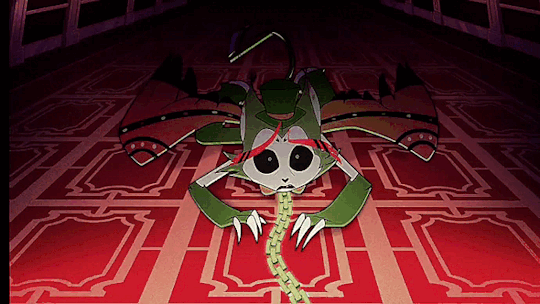
Husk is a powerful overlord, who lost his soul to a demon. Just like Alastor:
Husk: Big talk for someone, who's also on a leash.
Alastor and Husk are both on a leash. Still, Husk admits it and starts working on his shortcoming:
Husk: You're a loser, just like me
Alastor instead affirms his willingness to be in control and to pull the strings:
Once I figure out how to unclip my wings
Guess who will be pulling all the strings?
Alastor is a loser, just like Husk. Just like all the characters in hell. Sinners vs Winners. And yet, he refuses to admit it. This is why he makes no progress. Similarly, he wants freedom, but enslaves others. This isn't going to work out, which is why I am fairly certain he will eventually set Husk free. Probably by doing so, Alastor will make the first real step towards his own freedom. He will start integrating his own shadow.
Thank you for the ask!
#hazbin hotel#hazbin hotel meta#alastor#hazbin hotel alastor#charlie morningstar#my meta#asksfullofsugar#anonymous
408 notes
·
View notes
Text
was talking with @cringefailvox about canon radiostatic and ended up basically landing on how I think / hope their relationship in canon is mutually onesided:
maybe Alastor really enjoyed his friendship with Vox; maybe he misses it, and regrets losing it, and feels like Vox never held the same regard for their relationship as Alastor did due to how things ended
but over that is also a layer of Vox having been infatuated with Alastor and smarting over a rejection, and furthermore never quite being able to stop coveting Alastor as a person, as a source of power, and as a symbol specifically because despite being old fucking news Alastor is still so obviously, blatantly goddamn powerful in a way that incessantly flaunts his own outdatedness in the face of all of Vox's effort and innovation and accomplishment
just two people on completely different fucking pages, both wanting something from the other and angry and upset that the other can't just let them have it
maybe Vox's interest was romantic at one point but now it's just this amalgamation of pride and greed and resentment. very much "if he won't join me, I'll beat him." he doesn't love Alastor, but he carries the kind of resentment that's hard to generate if you didn't love a person (or at least the idea of them) at one point
meanwhile the reason that Alastor rejected him wasn't just because he wasn't interested in romance, but also because he lost respect for Vox as a person. it's all kinda wrapped up in itself - what Vox was asking for was too much, but part of the reason it was too much is because he was asking Alastor to sell out, because he was slowly finding more and more ways to sell out for the sake of power. and that's just the antithesis of what Alastor values and respects
the whole thing is framed in terms of old vs new technology but I feel like what it really comes down to is that Alastor values (his fucked up definition of) art and tradition, and Vox is the ultimate sellout
#personal#hazbin hotel#radiostatic#radiosilence#alastor#vox#hazbin hotel alastor#hazbin hotel vox#meta#hazbin hotel meta
356 notes
·
View notes
Text
Hazbin Hotel: Let's Talk About Cursing!
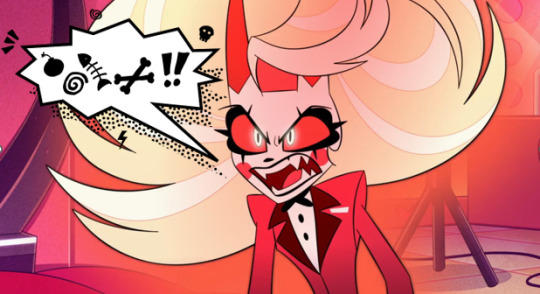
Trigger warning for lots of cursing in this post (obviously) and discussion of canon abuse scenes
As I delve further into the Hazbin Hotel fandom, I’ve inevitably come across a variety of people who dislike the show for an equal variety of reasons. One criticism I’ve seen with some consistency is in regards to the cursing and yeah, I get it. That’s not going to be everyone’s cup of tea. However, the repeated claim that the cursing is only there as a—failed—attempt at bad, lazy humor got me thinking about why I personally liked the cursing, and why I think it serves a greater purpose in the show.
Now yes, some of the cursing does function as an arguably simplistic joke. The most common setup I’ve noticed is one that leans into a contrast in tone/personalities. We see this a lot with the polite, comparatively timid Charlie as she navigates her distinctly vulgar domain.
Charlie: “Hi, mister!”
Demon: “Go fuck yourself!”
The entirety of “Happy Day in Hell” plays with this contrast, setting up Charlie’s slightly skewed, but significantly optimistic perspective of Hell. We are shown again and again how her lyrics are contradicted or twisted into something less innocent through the visuals: a “revealing” street where it’s “hard not to stare” has BDSM going on in a nearby window, Charlie will “open the door” for her people and then literally does so... for a guy who’s already dead. (Or, you know, temporarily out of commission until he heals, or whatever demons do when they’re ‘killed’ by things other than angelic steel.) The entire point here is to contrast the happy, skipping girl claiming that there’s a “warm, fuzzy feeling” in the air with the actual environment of unchecked fires and decaying limbs. And yes, that can be amusing. Not necessarily for everyone as humor is highly subjective and dependent on context, but distilling this contrast down to the shock of a polite greeting getting a “Go fuck yourself!” in response is a kind of entertainment. Especially when Charlie’s reaction adds another layer: for me that’s a very funny—and currently relatable—expression.
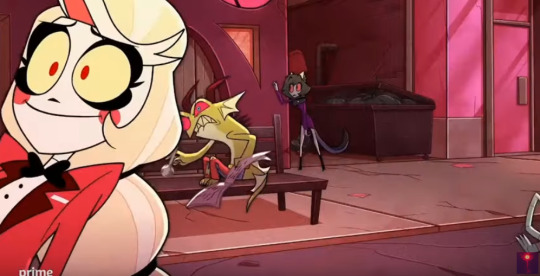
We can potentially make the case that this humor format overstays its welcome, but I personally think the show does a good job of keeping Charlie’s cursing both simple and comparatively rare, so that when she is put into these contrast situations the humor lands better. The best example I can think of in the latter half of the show is Susan. There we get the whiplash of polite, trying-to-get-these-people-to-like-her Charlie reaching a breaking point to become “FUCK YOU, YOU OLD BITCH” Charlie. It’s a moment that builds off of the earlier surprise of the courteous Alastor calling someone an “Ornery old bitch”—while Rosie is trying (and failing) to find a nicer way to phrase this.
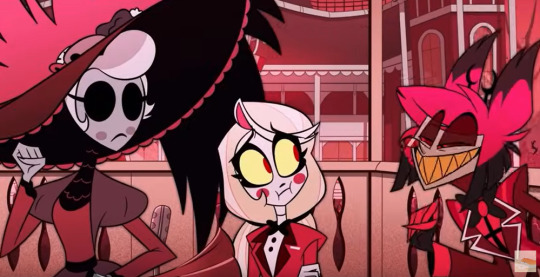
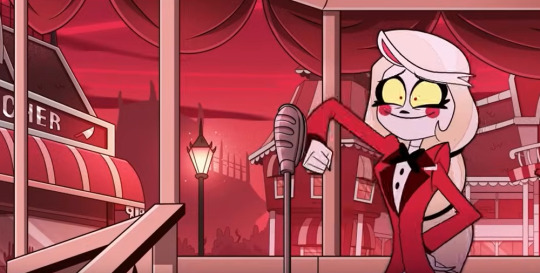
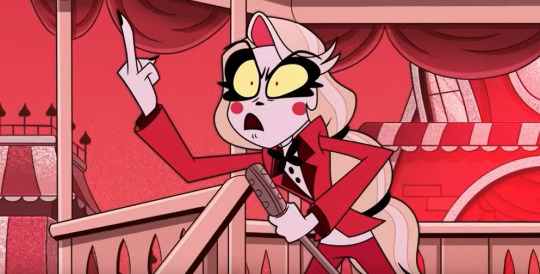
However, as stated above I think the cursing serves more of a purpose than to just be funny for (some) viewers. Beyond those who simply find cursing distasteful, I’ve seen a fair bit of, “This is so stupid. No one even talks like that!” going around.
Except... I do? I talk like that.
See, I like cursing. I was born to former hippie parents and grew up playing MMOs, so cursing was something I became pretty acclimated to. Personally, I’m glad I was because I’m fascinated by language and cursing—for better or worse—is an integral way that many people communicate. I was taught to see cursing not as the Bad Forbidden Thing You Must Never Ever Do, but rather as just another form of expression, something to be used in moderation and under specific circumstances. Once I became an adult I already understood how I wanted to curse and when it was appropriate to do so. People at work are often shocked when I tell them I curse a lot because no, of course I’m not doing that at my job. That isn't considered professional in this space. Among my friends though?
We can sound a lot like the Hazbin crew.
Undoubtedly the most common curse in the show is “fuck” and its variations, which very much tracks with my personal experience among other people who curse. In fact, it’s so ubiquitous that it barely counts as a curse at all in some groups. It’s more of an easy, accepted way to add emphasis. Vaggie’s “What the fuck was that?” about Alastor’s commercial is a perfect example. She’s pissed and simply saying “What was that?” doesn’t carry the same weight, no matter how angry she may sound when she says it. Vox’s long “Fuuuuuuuck” at the end of “Stayed Gone” conveys an emotion you just can’t capture any other way. No dialogue at all would create a fundamentally different experience of Vox’s feelings and another non-cursing response is just gonna hit different. Not necessarily bad, just different.
“I don’t want to go to the party!”
“I don’t want to go to the freaking party!”
“I don’t want to go to the fucking party!”
The above represents three distinct characters to me and I think Hazbin Hotel gets that. Cursing isn’t thrown around randomly because something something cursing supposedly sells; it’s all linguistically logical. Characters curse when something surprising or bad happens, or when something unexpectedly good happens, when they’re angry, trying to be sexy, or they want to add that emphasis. That’s a lot of different situations where cursing can be useful and when you use “fuck” in your daily life a lot you become pretty desensitized to it. As said, for many it’s barely a curse at all. Which means that when you really want to curse you’ve got to up the ante. It doesn’t surprise me one bit that the two uses of “cunt” I can recall—a word that is generally considered far worse than “fuck” and makes a lot of people understandably uncomfortable—is used by two of the worst characters in moments that are meant to horrify the viewer:
Adam: “Can’t wait a whole year to slaughter those little cunts / I know it’s just been a week, but we’ll be back in six months!”
Valentino: “When I say you’d better get that fucking cunt out of my studio, you say...?”
This horror is especially emphasized in Valentino’s scene. The creators know this word is coming up and deliberately build towards it. Angel is currently being abused and has been reminded that Valentino “owns” him. The above question is a part of a trio that Valentino asks (a standard structure in writing), wherein the third option is the outlier/most shocking of the three. The animation leans into that shock, with the music building and Valentino grabbing Angel to pull him close right on the word “cunt.” Perez even puts emphasis there because he knows that this is a significant word that will change our understanding of Valentino.
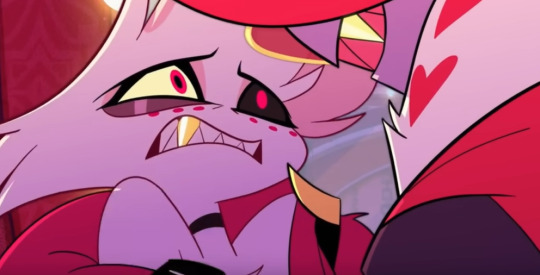
Despite having hit Angel multiple times and taunting him with the contract, this is the moment Valentino stops playing the ‘nice’ employer. This is the real him. No more fake compliments and endearments aimed at Charlie, no more fake comfort/intimacy aimed at Angel. That “cunt” conveys a hell of a lot about how Valentino really sees them and when you have a cast of characters who are already cursing on the regular, it takes a word on that level to do that kind of work. If Valentino had said, “get that fucking bitch out of my studio” it wouldn’t have had nearly the same impact because he’s the kind of guy who uses "bitch" even when playing ‘nice.’
Adam’s line from “Hell is Forever” does very similar work. The scene needs a word to align with the horrific reveal that another extermination is just six months away, that conveys Adam’s deep disgust for Charlie’s people, and that still catches the viewer’s attention even though he’s the character (I believe) who curses the most. Here the music drops and Adam is a little closer to speaking than singing; there's this shift because, like with Valentino, our perception of him is shifting. This isn’t just some egotistical idiot who wants to be called “Dick Master,” he’s the leader of an army coming to gleefully kill them. Framing a whole world of people—people Charlie loves—as “cunts” while treating their murder as a holiday that can’t come soon enough creates an, 'Oh shit. This guy is actually a threat' understanding that you can’t quite get with anything else.
On a smaller scale, cursing does other character work throughout the whole show. I watched a number of cursing compilation vids for this meta (that was a trip lol) and again, cursing is not thrown in randomly. Each character has a unique way of cursing that aligns with their personality and motivations:
As said, Adam curses the most in the show which helps sell his truly over-the-top, irreverent personality. Linguistically, the amount he curses also allows for some fun grammatical play. Lines like, “Fucking love putting my name on shit, shit’s the best!” help convey the versatility of cursing.
Also as said, Charlie curses a fair bit but she’s comparatively polite and her cursing tends to be a result of genuinely big emotions—like saying “Crap” when she’s shocked and falls, or “Shit!” when Adam locks her out of the room—rather than sprinkled into her conversations as a modifier. That leaves space to create those moments of amused surprise when Charlie really let’s loose.
Sr Pentious curses even less than Charlie which fits his secretly gooey center. He talks a big game at the start of the show, but he’s actually quite bad at being, well, bad (especially the Amazon version compared to pilot!Pentious). His idea of getting one over on Alastor is ripping a bit of his coat. He loves his Egg Bois and “doesn’t want to live” without them. He has no desire to go into battle without minions/a big machine to hide behind and, of course, he’s the first to be redeemed. He's too much of a secret sweetheart to curse a lot.
Interestingly, Niffty doesn’t seem to curse at all. At least, not enough for me to think of examples off the top of my head. Right now I’m inclined to read that as an extension of her lived experiences/design—the cute 1950’s housewife archetype who is obsessed with keeping things clean doesn’t [gasp!] curse—as well as a way to maintain her legitimate creep factor. As said, cursing is common among the hotel residents and is a way for them to linguistically fit in. Niffty, however, is positioned more as an outsider (despite how much they all obviously love her): she’s actually scary in a way most demons aren’t and despite how weird this whole world is, she stands out as someone no one else can make sense of (even Alastor). If cursing is normal, Niffty is a character who is decidedly positioned as not normal.
Angel curses a fair bit, though his irreverence is conveyed more through innuendos. Angel is great at verbally twisting others’ words (especially Husk’s) to give himself a conversational advantage:
Husk: “Go fuck yourself”
Angel: “Only if you watch me~”
Husk: “You’ve come—”
Angel: [very loud orgasm noise]
Husk: “...to the right place.”
Meanwhile, Husk uses “fuck” plenty, but he’s also one of the few characters who use “bullshit" too. I wouldn’t say there’s anything particularly revealing about that choice, but just giving him a go-to curse that’s otherwise used infrequently helps make his character distinct in a cast of other cursing characters.
Vaggie occasionally curses in Spanish, showing us her heritage if she used to be human, or a distinct knowledge/verbal preference if she’s always been an angel.
Heaven, as the ‘good’ side, doesn’t curse as a general rule, which leaves room for cursing to do more of that silent character work. We’re reminded of the stuffy, overly critical beings she’s dealing with when Charlie receives the combined judgement of the court for saying, “Fuck yeah!” In contrast, we understand just how shocked St. Peter is to see a Morningstar when he lets out an unintentional “Fuck!” The angry vindication of Charlie’s “That’s what the fuck I’ve been saying!” lands harder after multiple scenes of very little cursing, and Lute’s “Some crack-whore who fucked up already? / He blew his shot like the cocks in his mouth—” helps set her apart as an exorcist + Adam's second in command: her shocking violence comes through in her word choice too; words that supposedly don't belong in Heaven.
In what’s arguably the funniest line in the whole show, Lucifer undermines his dramatic standoff with Adam by going, “You mess with my daughter and now I’m going to fuck you.” Beyond just cutting the tension, that fits his bumbling, oblivious personality perfectly. Lucifer is crazy powerful and can absolutely wreck Adam. He also has none of the classy intimidation that, say, Alastor displays when he tries to convey that. This is a depressed himbo who makes ducks in his free time and settles on, “Hey, bitch!” when greeting his estranged daughter. Of course he’s going to accidentally turn a threat into a promise of sex.
Which finally brings me to Alastor, someone whose cursing is already understood well by the fandom. He’s characterized as manipulatively courteous, using manners to both hide his true nature and draw attention to his power—’You’re so beneath me I’ll just calmly sip my coffee and politely ask who you are, despite the fact that we've fought multiple times.’ This is a guy who calls people “My dear” and unironically insults them with the phrase “wacky nonsense.” So when he curses you can BET it’s gonna have an impact. It sure did for me. I had to pause the episode after Alastor’s first “Fuck you” because it was so shocking to hear that language from him. And that’s the point! The scene wants that reaction from the audience. The "Fuck you"s visceral anger contrasting the fake laughs he and Lucifer have been giving, the quick-fire exchange that’s suddenly cut short by Alastor’s choice of a direct insult, the fact that he’s officially dropping the polite veneer they’ve both been indulging in and raising the stakes before Charlie intervenes, the loss of the radio filter that otherwise demonstrates his control over a situation... all of it screams, ‘THIS IS AN IMPORTANT CHARACTER MOMENT.’

"Fuck you” reveals that, for the first time in the show, Alastor is legitimately threatened by someone. Which makes sense given that, you know, Lucifer is the King of Hell. Cursing for Alastor isn’t normal, so when he does curse it’s going to reveal something about a guy who otherwise is obsessed with being unknowable. Having the King of Hell dismiss him is actually infuriating in a way Sir Pentious’ threats could never be and the exchange kicks off a rivalry that rattles Alastor in ways Vox’s never has. (Side note: is it any wonder people ship them? Character A making control freak Character B feel vulnerable is classic!) It’s no surprise to me than that the one other true curse we get from Alastor is, “I’m about to end your fucking life,” delivered to Adam who, like Lucifer, poses a legitimate threat and does end up beating him. I say “true” curse because calling Susan a “bitch” does similar work for him, but the takeaway is humorous rather than dramatic. It’s funny that the only people who can piss Alastor off enough to curse are the First Man/a powerful exorcist angel threatening his life, the literal King of Hell... and Susan.
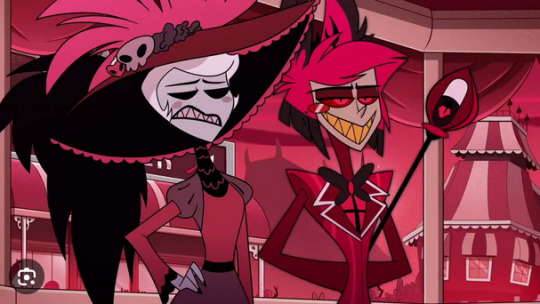
So there’s a lot going on here, more than what many viewers might assume if they approach the show as just “stupid,” needlessly vulgar entertainment. As shown above, I don’t think the cursing is needless, especially given that, well... they’re in Hell. They’re sinners, supposedly the worst that humanity has to offer, so of course they're going to curse a lot. Does cursing mean you’re a bad person? No. Can you craft a hellish world that doesn't rely on cursing to convey a group's immoral nature? Sure.
Does it make sense that a writer would equate a sinful, irreverent cast with linguistic rebellion and would want to convey a certain vibe that, frankly, you just can’t get without dropping an F bomb?
Yeah, I think so. No one has to like that kind of creative decision, but it’s worth acknowledging it as a deliberate choice.
That’s all! Thanks for reading this fucking long post ✌️
228 notes
·
View notes
Text
Paradise Lost: How John Milton's 1667 work influenced "Hazbin Hotel"
I've been thinking about why the "fruit of knowledge" in Hazbin Hotel is depicted as an apple, as opposed to another fruit that would've been more accurate to the Middle East during the Fall of Man, as well as how Paradise Lost by John Milton (1667) influenced the show.
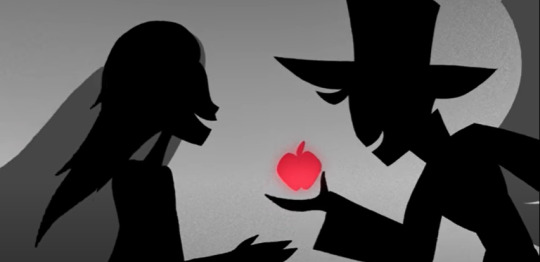
Per one source:
"Because the Hebrew Bible describes the forbidden fruit only as 'peri', the term for general fruit, no one knows [what exactly type of fruit it was]. It could be a fruit that doesn't exist anymore. Historians have speculated it may have been any one of these fruits: pomegranate, mango, fig, grapes, etrog or citron, carob, pear, quince, or mushroom."
Per Wikipedia:
"The pseudepigraphic Book of Enoch describes the tree of knowledge: 'It was like a species of the Tamarind tree, bearing fruit which resembled grapes extremely fine; and its fragrance extended to a considerable distance. I exclaimed, How beautiful is this tree, and how delightful is its appearance!' (1 Enoch 31:4)."
In Jewish and Islamic traditions, the "fruit of knowledge" is commonly identified with grapes. The Zohar explains that Noah attempted (but failed) to rectify the sin of Adam by using grape wine for holy purposes. Today, the "Noah grape" is still used to make white wine.

Furthermore:
"The association of the pomegranate with knowledge of the underworld as provided in the Ancient Greek legend of Hades and Persephone may also have given rise to an association with knowledge of the 'otherworld', tying-in with knowledge that is forbidden to mortals. It is also believed Hades offered Persephone a pomegranate to force her to stay with him in the underworld for 6 months of the year. Hades is the Greek god of the underworld, and the Bible states that whoever eats the forbidden fruit shall die."
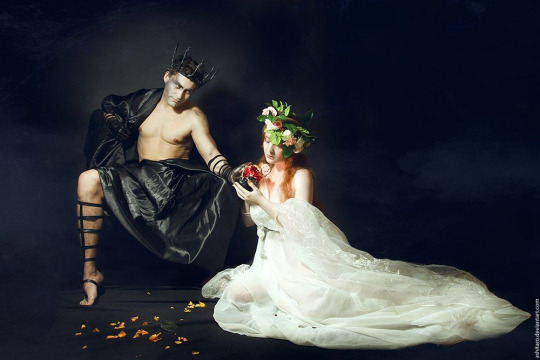
So, how then did the apple become the foremost symbol of the "fruit of knowledge"? You can partly thank Paradise Lost by English poet John Milton, a work which the lore of Hazbin Hotel is based off of.
Milton published the book in 1667, a time when the hedonistic Restoration era was in full swing. The exiled King Charles II was restored to the throne as King of England in 1660, and was a party animal, with dozens of mistresses, and nicknamed both the "playboy prince" and "Old Rowley", the latter after his favorite lustful stallion.
However, the association of the "fruit of knowledge" began with a Latin pun long before Milton immortalized the association in Paradise Lost. Per the linked article above by Nina Martyris for NPR:
"In order to explain, we have to go all the way back to the fourth century A.D., when Pope Damasus ordered his leading scholar of scripture, Jerome, to translate the Hebrew Bible into Latin. Jerome's path-breaking, 15-year project, which resulted in the canonical 'Vulgate', used the Latin spoken by the common man. As it turned out, the Latin words for evil and apple are the same: 'malus'.
[...] When Jerome was translating the 'Tree of the Knowledge of Good and Evil', the word 'malus' snaked in. A brilliant but controversial theologian, Jerome was known for his hot temper, but he obviously also had a rather cool sense of humor.
'Jerome had several options,' says Robert Appelbaum, a professor of English literature at Sweden's Uppsala University. 'But he hit upon the idea of translating 'peri' as 'malus', which in Latin has two very different meanings. As an adjective, 'malus' means 'bad' or 'evil'. As a noun it seems to mean an apple, in our own sense of the word, coming from the very common tree now known officially as the 'Malus pumila'. So Jerome came up with a very good pun.'
The story doesn't end there. 'To complicate things even more,' says Appelbaum, 'the word 'malus' in Jerome's time, and for a long time after, could refer to any fleshy seed-bearing fruit. A pear was a kind of 'malus'. So was the fig, the peach, and so forth.'
Which explains why Michelangelo's Sistine Chapel fresco features a serpent coiled around a fig tree. But the apple began to dominate Fall artworks in Europe after the German artist Albrecht Dürer's famous 1504 engraving depicted the First Couple counterpoised beside an apple tree. It became a template for future artists such as Lucas Cranach the Elder, whose luminous Adam and Eve painting is hung with apples that glow like rubies.
Milton, then, was only following cultural tradition. But he was a renowned Cambridge intellectual fluent in Latin, Greek and Hebrew, who served as secretary for foreign tongues to Oliver Cromwell during the Commonwealth. If anyone was aware of the 'malus' pun, it would be him, and yet he chose to run it with it. Why?
Appelbaum says that Milton's use of the term 'apple' was ambiguous. 'Even in Milton's time the word had two meanings: either what was our common apple, or, again, any fleshy seed-bearing fruit. Milton probably had in mind an ambiguously named object with a variety of connotations as well as denotations, most but not all of them associating the idea of the apple with a kind of innocence, though also with a kind of intoxication, since hard apple cider was a common English drink.'
It was only later readers of Milton, says Appelbaum, who thought of 'apple' as 'apple', and not any seed-bearing fruit. For them, the forbidden fruit became synonymous with the 'malus pumila'. As a widely read canonical work, 'Paradise Lost' was influential in cementing the role of apple in the Fall of Man story."
To tie this back into John Milton's relationship with King Charles II of England, as mentioned, Milton originally served Oliver Cromwell, Lord Protector of England, and the English Commonwealth, which was formed with the overthrow and execution of King Charles I on 30 January 1649, following the bloody English Civil War (1642 – 1651).
The King's two sons - the newly-christened King Charles II, the elder, and James, Duke of York (King James II), the younger - fled into exile on the European continent. However, with the death of Oliver Cromwell on 3 September 1658 came the 2-year-long dissolution of the English Commonwealth, and the restoration of the monarchy.
As for Milton himself, we can look to an article by Bill Potter.
Milton, born on 9 December 1608, was around 51-52 years old when King Charles II was restored to the throne. He attended Christ's Church, Cambridge in his youth, and mastered at least six languages, as well as history and philosophy; making him, perhaps, the most knowledgeable poet in history. He spent more than a year travelling across Europe, conversing with and learning from intellectuals, linguists, poets, and artists, including the famous Galileo Galilei.
However, Milton was a controversial figure of his time, being unafraid to criticize institutions of authority; arguing that "divorce was Biblical", for which he was routinely condemned; joining the Puritans; penning the Areopagitica, a treatise on liberty in favor of Parliament and the Roundhead rebels, during the reign of King Charles I, arguing that the King must be held accountable by the people; and agreed with and justified the murder of King Charles I, for which Parliament hired him in 1649 as a propagandist and correspondence secretary to foreign powers, on account of his fiery manifestos against "the man".
The collapse of the Commonwealth with the death of Oliver Cromwell in 1658 did not deter Milton from continued political writing against the monarchy and the new public sentiment that brought about its Restoration under King Charles II in 1660. On the contrary, Milton - now totally blind, having lost his eyesight by the age of 44 in 1652, a decade earlier - began writing Paradise Lost in 1661, and spent the next six years dictating the work to transcribers.
A supporter of regicide, Milton was also forced into exile himself, and faked his own death, as Charles refused to pardon - and sought to execute - any of those directly involved with his father's murder. Milton's friends held a mock funeral for Milton on 27 August 1660, just months after the coronation of King Charles II on 23 April 1660.
King Charles II commented that he "applauded his [Milton's] policy in escaping the punishment of death [execution for treason] by a reasonable show of dying", but insisted on a public spectacle nonetheless by having Milton's writings burned by the public hangman.
After eventually obtaining a general pardon from King Charles II, Milton was imprisoned, and released, likely due to political friends in high places. He died, aged 64, in 1674. His theological views were sometimes considered heterodox by the best Puritans, and his political views came close to getting him executed on several occasions. His poetry, however, has endured as some of the greatest works in the English language, especially Paradise Lost; much of his greatest work was written during his 22 years of complete blindness.
One of the main factors in King Charles II deciding to grant a pardon to Milton was, ironically, Paradise Lost. While originally written by Milton as a scathing criticism of King Charles II and the monarchy - depicting Lucifer Morningstar as a sympathetic rebel against God, with King Charles II claiming that is right to rule came from "divine ordainment" - Charles II enjoyed the work, and authorized its publication on 20 August 1667. We know this because a 1668 copy of Paradise Lost in royal bindings by Samuel Mearne, bound lovingly in a fine red leather made of goat skins tanned with sumac, and stamped in gold with the royal cypher of King Charles II, was found. The endpapers bore a watermark with the royal arms of Charles II.
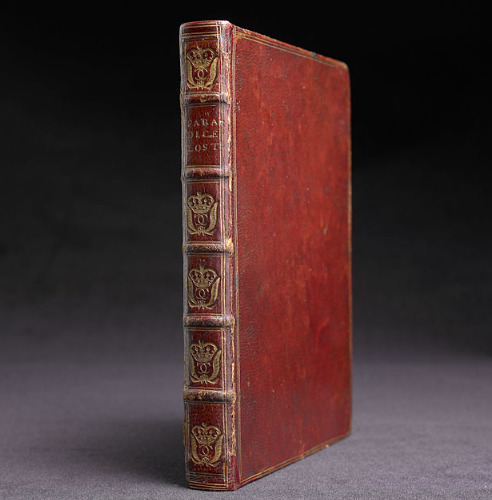
Per one Miltonian scholar: "The most single important event in Milton's life was the event against which he struggled most: the Restoration of Charles II, [and his relationship with the King]. Had it not come, we might have never had Paradise Lost...certainly, we should never have had [it] in [its] present power and significance."
Milton followed up Paradise Lost with Paradise Regained in 1671, three years before his death, with advice for King Charles II, urging the hedonistic Charles to "reign over himself and his passions":
"For therein stands the office of a King, His Honour, Vertue, Merit and chief Praise, That for the Publick all this weight he bears. Yet he who reigns within himself, and rules Passions, Desires, and Fears, is more a King; Which every wise and vertuous man attains: And who attains not, ill aspires to rule Cities of men, or head-strong Multitudes, Subject himself to Anarchy within, Or lawless passions in him which he serves." - John Milton, Paradise Regained, Book II, lines 463-472
To summarize: "If we must have a King back again, my Lord, please try to be a good man, unlike your father, who fell to his pride, [which was also the downfall of Lucifer]."
To quote another source: "Though the passage begins by noting that the office of a King is to bear the weight of public concerns, it is the control of one's private concerns that truly set a King apart as a virtuous character. Indeed, so important is self-command that any wise or virtuous man who attains it is like a king; any king who does not practice [self-command] is nothing more than a mere subject, ruled by anarchy and lawlessness."
Milton's words, too, echo a work written by Charles' grandfather, King James VI/I of Scotland and England: Basilikon Doron ("Royal Gift").
Per Wikipedia:
"'Basilikon Doron' (Βασιλικὸν Δῶρον) means 'royal gift' in Ancient Greek, and was written in the form of a private letter to James' eldest son, Henry, Duke of Rothesay (1594–1612). After Henry's death, James gave it to his second son, Charles, born 1600, later King Charles I. Seven copies were printed in Edinburgh in 1599, and it was republished in London in 1603, when it sold in the thousands.
This document is separated into three books, serving as general guidelines to follow to be an efficient monarch. The first describes a king's duty towards God as a Christian. The second focuses on the roles and responsibilities in office. The third concerns proper behaviour in daily life.
As the first part is concerned with being a good Christian, James instructed his son to love and respect God as well as to fear Him. Furthermore, it is essential to carefully study the Scripture (the Bible) and especially specific books in both the Old and New Testaments. Lastly, he must pray often and always be thankful for what God has given him.
In the second book, James encouraged his son to be a good king, as opposed to a tyrant, by establishing and executing laws as well as governing with justice and equality, such as by boosting the economy. The final portion of the Basilikon Doron focuses on the daily life of a monarch.
All of these guidelines composed an underlying code of conduct to be followed by all monarchs and heads of state to rule and govern efficiently. James assembled these directions as a result of his own experience and upbringing. He, therefore, offered the 'Basilikon Doron' ('Royal Gift') to his son, with the hope of rendering him a capable ruler, and perhaps to pass it down to future generations.
Overall, it repeats the argument for the divine right of kings, as set out in 'The True Law of Free Monarchies', which was also written by James. It warns against 'Papists' (Roman Catholics) and derides Puritans, in keeping with his philosophy of following a 'middle path', which is also reflected in the preface to the 1611 King James Bible. It also advocates removing the Apocrypha from the Bible."
King James VI/I further instructed his son and grandson:
"A good monarch must be well acquainted with his subjects, and so it would be wise to visit each of the kingdoms every three years."
"During war or armed conflict, he should choose old-but-good captains to lead an army of young and agile soldiers."
"In the court and the household, [a royal] should carefully select loyal gentlemen and servants to surround him. When the time came to choose a wife, it would be best if she were of the same religion and had a generous estate. However, she must not meddle with governmental politics, but perform her domestic duties."
"As for inheritance, to ensure stability, the kingdom should be left to the eldest son, not divided among all children."
"Lastly, it is most important...that [a royal] would know well his own craft...to properly govern over his subjects. To do so, [one] must study the laws of the kingdom, and actively participate in the council. Furthermore, [one] must be acquainted with mathematics for military purposes, and world history for foreign policy."
"[A royal] must also not drink and sleep excessively. His wardrobe should always be clean and proper, and he must never let his hair and nails grow long. In his writing and speech, he should use honest and plain language."
King James VI/I further supplemented Basilikon Doron with a written treatise titled The True Law of Free Monarchies: Or, The Reciprocal and Mutual Duty Between a Free King and His Natural Subjects.
"It is believed King James VI/I wrote the tract to set forth his idea of absolutist monarchism in clear contrast to the contractarian views espoused by, among others, James' tutor George Buchanan (in 'De Jure Regni apud Scotos'), [which] held the idea that monarchs rule in accordance of some sort of social contract with their people. James saw the divine right of kings as an extension of the apostolic succession, as both not being subjected by humanly laws."
Milton's own Areopagitica was a follow-up on De Jure Regni apid Scotos by George Buchanan, and also to The True Law of Free Monarchies, as well as the idea of the "divine right of kings". It takes its title in part from Areopagitikos (Greek: Ἀρεοπαγιτικός), a speech written by Athenian orator Isocrates in the 4th century BC.
Most importantly, Milton also wrote on the concept of free will: "Milton's ideas were ahead of his time in the sense that he anticipated the arguments of later advocates of freedom of the press by relating the concept of free will, and choice to individual expression and right."
The concept of free will, too, was a major topic explored in Paradise Lost. Per one source: "In 'Paradise Lost', Milton argues that though God foresaw the Fall of Man, he still didn't influence Adam and Eve's free will. [...] God specifically says that he gives his creatures the option to serve or disobey, as he wants obedience that is freely given [or chosen], not forced. Some critics have claimed that the God of the poem undercuts his own arguments; however, Milton did not believe in the Calvinistic idea of 'predestination' (that God has already decided who is going to Hell and who to Heaven), but he often comes close to describing a Calvinistic God. God purposefully lets Lucifer (Satan) escape Hell, and sneak past Uriel into the Garden of Eden, and basically orchestrates the whole situation so that humanity can be easily ruined by a single disobedient act. In describing the Fall of Man before it happens, God already predicts how he will remedy it, and give greater glory to himself by sending his Son [Jesus Christ] to die, and restore the order of Heaven."
In Hazbin Hotel, Adam also describes the Calvinistic idea of 'predestination', and that "the rules are black and white":

However, "This possible predestination leads to the theory of the 'fortunate fall', which is based on Adam's delight at learning of the eventual coming of the Messiah [from his bloodline]. This idea says that God allowed the Fall of Man, so that he could bring good out of it, possibly more good than would have occurred without the Fall, and be able to show his love and power through the incarnation of his Son. In this way, the free will of Adam and Eve (and Lucifer/Satan) remains basically free, but still fits into God's overarching plan."
However, there is one major flaw with this, and that is that we don't know if Jesus Christ exists within the Hazbin Hotel universe or not. Yet Charlie Morningstar, the daughter of Lucifer Morningstar and Lilith, and the "Princess of Hell", is depicted as a savior-esque figure within the show who, like God in Paradise Lost, encourages lowly sinners to choose obedience to God out of their own free will. More interestingly, Charlie does not come from Adam's bloodline; yet, while Lucifer decries 'free will', Charlie supports 'free will' instead.
Perhaps is is merely because Charlie, being the daughter of Lucifer and Lilith, claims to want to fulfill Lilith's "dream" of humanity being empowered in Hell ("The mind is its own place, it can make Heaven out of Hell, or Hell out of Heaven" - Lucifer, Paradise Lost); however, I think it also stems from Charlie having a genuine belief that 'free will', and people choosing to do good instead of evil, is "good" and "Godly".
True to Paradise Lost, this is also in fulfillment of God's plan; and, according to one fanfiction, why God allowed Charlie to be born to Lucifer and Lilith, so that sinners may be redeemed through Charlie.
For more on differing interpretations of 'free will', I suggest reading: "Free Will and the Diminishing Importance of God's Will: A Study of Paradise Lost and Supernatural" by Kimberly Batchelor (2016)
Excerpt: "'Paradise Lost' –and Milton’s purpose for writing the poem— is rooted deeply in postreformation Arminianism and this is apparent in its employment of free will. Chapter 1 argues that Milton turns to free will as a tool to justify the actions of God. Freedom of choice is God-given, and sets up a morality in which right and wrong are dictated by God. Chapter 2 shows that in 'Supernatural', free will is not given by a higher power; and, in fact, free choice functions as an act of defiance against God's will."
This raises the question: Is 'free will' given by God, using Lucifer as his vessel, in Hazbin Hotel, as in Paradise Lost? Or is 'free will' not given by a higher power; and, in fact, an act of defiance against God?
This brings us back around to our first question: Why is an apple, or 'malus', used to depict the "fruit of knowledge", especially if 'malus' means 'bad or evil', whereas Milton depicts 'free will' as God-given?
Well, for one, Lucifer still chooses to associate himself with apple symbolism and imagery, despite being skeptical of free will:
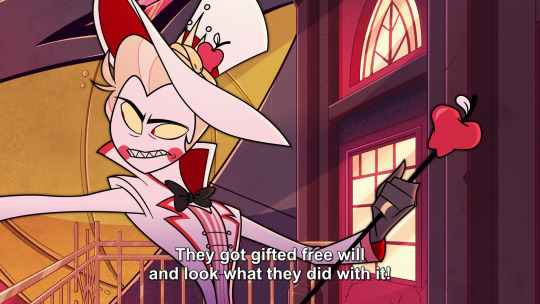
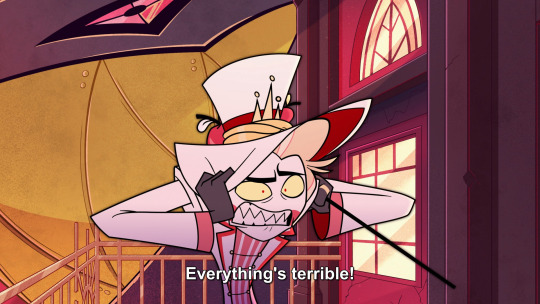
Based on the introduction to Episode 1, Charlie also views 'free will' as a gift (Miltonian), whereas Lucifer appears to view it as a curse.
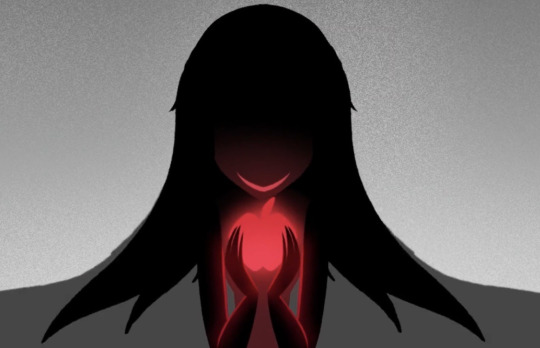
However, Charlie also notes that it was through the 'gift' of free will that the "root of all evil" entered the world, for if mankind could choose to be good, then they could also choose to be evil ('malus').
John Milton states in Paradise Lost: "Of Man's First Disobedience, and the Fruit Of that Forbidden Tree [malus], whose mortal taste Brought Death (evil, malus) into the World, and all our woe."
Thus, the use of an apple specifically is likely a tie-in to what others have been speculating about a character that series creator Vivienne Medrano (Vivziepop) alluded to a while back: "The Root of All Evil".
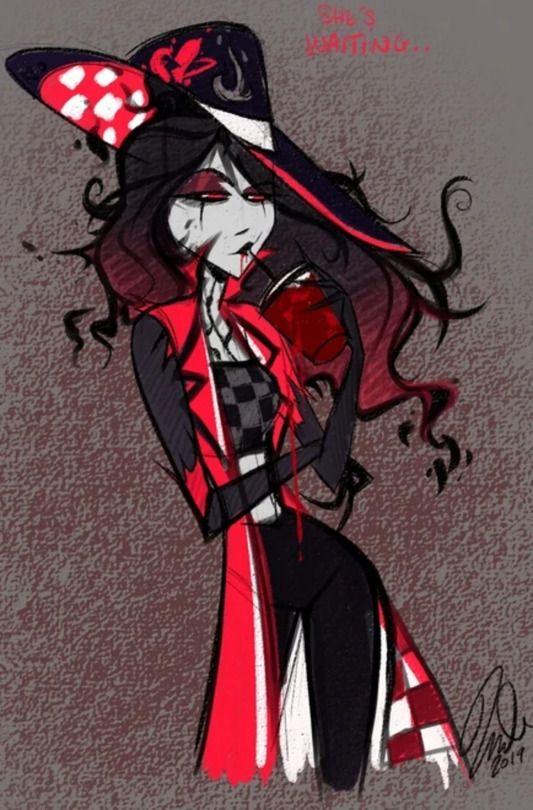
However, "Roo" itself is depicted as possessing the body of a human woman, presumably Eve, the first one to eat the "fruit of knowledge":
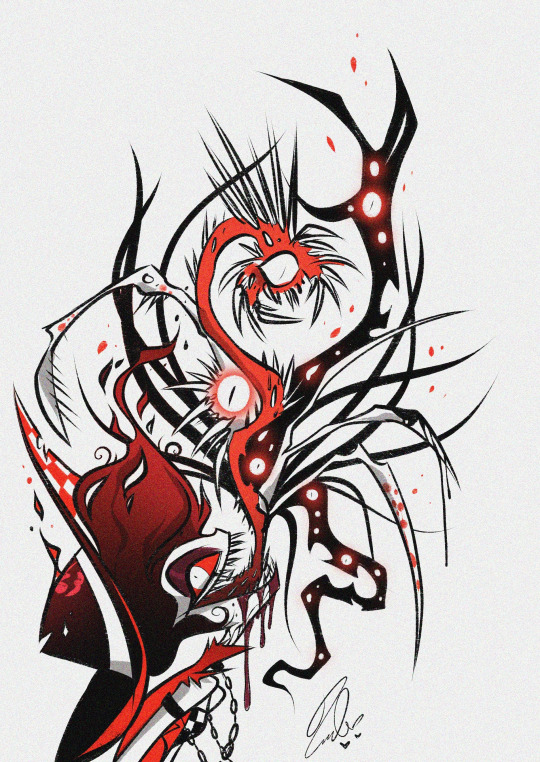
Thus, we can discern that "Malus" likely refers to this character. (Also see: "Maleficent", a name that also uses the root word "mal", "evil".) As for Roo's intentions, if Charlie is "good" - and, if, in fact, Alastor was sent by "Roo" (Eve) - then they may want for Alastor to work on their behalf to "corrupt" Charlie, or make sure the hotel never succeeds.
This is because demonic power is tied to human souls, and there are "millions of souls" in Hell, which likely fuels the great power of "Roo". The more souls there are in Hell, the more powerful "Roo" becomes. The Overlords also get their demonic power from "millions of souls".
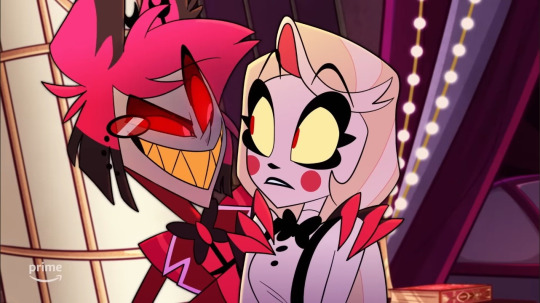
The deal between Eve and "Roo" might even be the first contract, or deal, between a human soul and a demonic entity; in exchange for 'free will', and the knowledge of good and evil, Eve allowed the "Root of All Evil" to inhabit her body, and to escape the void or prison it was confined to by Heaven (Hell?). (For one cannot be 'all-good' unless you attempt to 'eliminate' or 'ablate' evil; and, in Greek mythology, Zeus imprisoned the Titans in Tartarus for all of their evil deeds.)
Another possibility, brought up in an article by Gillian Osborne, is that Lucifer sees the "fruit of knowledge" as an apple, but it may appear as different fruits to different people, depending on how they view it. This also fits with Lucifer and angels being able to easily shapeshift.
In Paradise Lost, only Lucifer describes the fruit as an "apple" (malus), as he associates malus with "bad, evil", while the narrator also describes the fruit as "a mix of different colors" and peach-like. This then begs the question: "Did the fruit of knowledge of good and evil become 'evil' because Eve harbored resentment towards Adam?"
Quote: "Lucifer (Satan) gives Eve yet another hint that this tree may be more complicated than he wishes her to believe: although elsewhere in Milton's poem Eden is heady with its own newness, sprouting spring flowers left and right, the tree of knowledge is already old: its trunk is 'mossie'. Nevertheless, Lucifer claims to wind himself around the tree 'soon'; the quickness of his reported arrival stands in contrast to the timescales required to cover a fruit tree with moss (PL 9.589). Placing Lucifer's winding body between these two timescales—an easeful present and the inhuman scale of natural history—Milton suggests that there is something dangerous in entangling the past with the present. Yet, 'Paradise Lost' also makes deep biblical history feel like present politics for its readers. When Adam and Eve wander out of Eden at the end of the poem, they famously make their way not only into an earthly paradise, but also into the present. Eden's mossy apple tree therefore represents the pitfalls of conflating nature and history, of seeing any action in human history—even Eve's eating of an apple—as natural, if by nature, we mean inevitability. For Milton, history, unlike nature, is directed by humans, progressive, and, like the reading of 'Paradise Lost', hard work. While trees may inevitably collect moss the longer they live, Adam and Eve's labors in the garden, and our labors of reading, require agency and effort. Milton's poem refuses mourning the loss of Eden, [and the perfection of Heaven], in favor of a perpetual, melancholic, recreation of paradise: a present perfecting."
To quote Twisted: The Untold Story of a Royal Vizier, which also draws inspiration from John Milton's Paradise Lost: "It's an unfortunate situation...but you do have a choice [i.e. free will]."
#hazbin hotel#hazbin hotel analysis#hazbin#hazbin analysis#hazbin hotel meta#hazbin meta#hazbin hotel theory#hazbin theory#deep thoughts#john milton#paradise lost#eve hazbin hotel#lucifer hazbin hotel#lucifer morningstar#adam hazbin hotel#lilith hazbin hotel#lilith morningstar#roo hazbin hotel#root of all evil
204 notes
·
View notes
Text
The finale finally gave us a clue on how Adam feels about sinners.
Specifically, that he feels they are ungrateful losers.
We already knew he was dismissive of sinners despite them all technically being his descendants, but of course I’m really interested that he specifically called them ‘ungrateful losers.’
Because that introduces a brand new layer to why he’s so merciless towards sinners. Why he delights in killing them.
He’s punishing them.
Sinners are his progeny. They came from him. He STARTED humanity. He makes it clear that he is very proud of being the father of humanity.
And he got into heaven but the majority of mankind didn’t.
And he canonically was the first human soul in heaven.
Can you imagine him, arriving in heaven? None of the angels know why he’s there. Adam has no idea how he got there. And so he rationalized that he got there simply by being Adam. He started humanity. He’s awesome. So he deserved heaven.
He’s so amazing he was made into an Angel. Not just a regular soul. AN ANGEL.
So imagine how shocked he must have been when not all of his descendants made it to heaven. That some of them were sent to the realm of his worst enemy. The one who introduced suffering to his people.
Can you imagine how angry he must have been to see so many of his descendants going to Hell they were having an OVERPOPULATION problem!
How could they not make it to heaven when Adam himself made it by just being Adam? Why did they go to hell? Just being a descendant of Adam should have been a free ticket in so what happened?
They fucked up is what happened. They fucked up so badly that just the privilege of being descended from Adam, THE FIRST MAN, wasn’t enough to get them in.
Can you imagine how mad that would make him? He set up everything perfectly but his people fucked up enough to be sent to hell. They wasted the chance Adam gave them. They showed that just being from him wasn’t enough.
They were ungrateful for the chance he gave them.
And so he wants them gone. They failed to live up to his name. They failed to reach Heaven and so they don’t matter. Their souls don’t matter. Their regrets don’t matter. Their lives don’t matter. They are no longer Adam’s people. They’re losers, so why should he care about them?
In the end, Adam is basically an angry parent, punishing his ungrateful children for failing to live up to his expectations.
#hazbin hotel spoilers#hazbin hotel#hazbin hotel meta#hazbin lilith#hazbin charlie#hazbin alastor#hazbin adam#hazbin angel dust#hazbin husk#hazbin sir pentious#hazbin nifty#hazbin vaggie
241 notes
·
View notes
Text
Episode 4 of Hazbin is quite literally the best episode so far. It doesn't suffer from the vivzieisms that the first three episodes did and fundamentally told a better story about an SA and abuse survivor than I've seen in a long time, speaking from being an SA survivor. Angel being an unperfect and sometimes downright awful person with how he acts around people is really important to portray. When people always see perfect victims, they then like to dismiss victims who are assholes. NEWSFLASH!!! Many victims suffer negatively to their social skills when they are being abused!
Especially with Angel's hypersexual demeanor to everyone, I find it so refreshing how he even sees the need to be desired by everyone as crucial while also hoping that they reject him the same time. He feels the need to be the person that he pretends to be in all his videos because then he is desired by people; wanted. But he hates being Valentino's favorite toy. He needs to be wanted, but hates hates the biggest source of it, since it is the source of his abuse.
#hazbin#hazbin hotel#angel dust#helluva boss#hazbin meta#hazbin hotel angel dust#hazbin hotel meta#hazbin analysis#hazbin hotel analysis#character analysis#angel dust analysis#vivziepop#vivzieverse
178 notes
·
View notes
Text
Now that i got to sleep, time to rant:
Okay, Vox, my beloved, WTF are you talking about?
Like, there isn't a new Power vacum in hell, almost everything will still keep runing as it was! The things that change are:
-No exorcists means less angelic metal trickling down, so that could affect Carmilla's business a little
- Without the anual purge there will be more people for longer time in hell, that means more souls to put under contract and that could make the Vees more powerful, i guess
- People saw Alastor eat shit, but he was still going toe-to-toe with a real powerful angel. Also, he was in the downlow for so long most desmons probably don't give a damn.
Like, i'm really not getting what he was so hyped about, need more context
Also, is not like people will start running to the Hotel, yeah they are powerful people that are offering free protection, but, so far, THEY don't know redempition is possible yet, and i got a feeling Sera will try to keep it that way
Soooo, yeah, need to know more about the Vee's plan to even star to get where he is coming from
But more of this, please ❤️

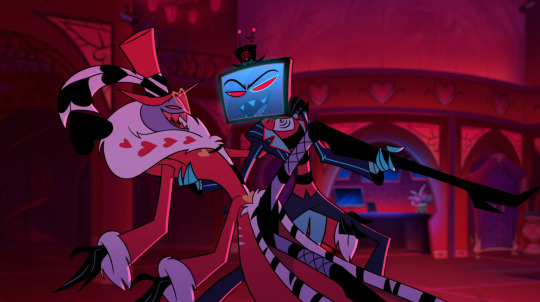
#hazbin hotel#character analysis#more like questioning#hazbin hotel meta#hazbin valentino#hazbin alastor#hazbin Vox#hazbin carmilla#voxval#staticmoth
160 notes
·
View notes
Text
So, saw a video on YouTube that was analyzing if Alastor exhibited traits similar to someone diagnosed with antisocial personality disorder. It was interesting, if a bit superficial and missing a lot of the smaller blink and you’ll miss it details (as well as for some reason omitting his past relationships and focusing only on his current ones), but it got me thinking about how much we know of who Alastor is.
And I think that we actually know a lot more about who he is as a person and what makes him tick than we think we do. What we don’t know is what his situation currently is, and that’s sort of conflated with not knowing or being sure of him and his motivations.
So to list what we do know of him in no specific order:
He claims he’s sponsoring the hotel because he wants to watch other people fail for his own entertainment, something that we know for sure now is not the case, or not the entire reason.
He was very desperate when making that deal with Charlie, this is something he was probably aiming for and has been waiting to do for a long time.
His disappearance is a sore spot that he doesn’t want others to be prying into.
He’s trapped in a deal that appears to be restricting either his actions, power, or both and he desperately wants to get out of the deal.
Related, the deal appears to be new, based off Husk’s comment and Alastor’s reaction/surprise at the comment.
Related, he HATES being reminded of his deal.
All his shown past friends are women. Conversely, he seems to get along well with women over men.
Related, he lets Mimzy, Nifty, and Rosie all touch or manhandle him around without showing discomfort or distaste. He also lets Husk poke him in the chest, and appears to have grown equally as comfortable around Charlie.
Related, he offers Charlie his microphone twice when she needed to do a big inspiring speech.
Related, his microphone appears directly linked to some of his powers, and could also be considered a weakness of his should it be broken.
He knows that Mimzy only ever comes to him when she needs something, and doesn’t care that he’s being manipulated and taken advantage of into taking care of her problems. In fact, Mimzy stated that he loves taking care of her (problems).
Related, the hotel is important enough that he can’t risk having that kind of behavior with Mimzy here, that he’s willing to shoo away one of his few friends he’s genuinely happy to see.
Rosie is his best friend, he’s the most comfortable with her and while in Cannibal town. It’s the only time we’ve seen him so cheerful and relaxed and smile like he means it. His smiles here are wide enough to show his gums, but his eyes and lips reveal its not just a well disguised snarl.
Related, he’s very excited to show off Cannibal town to Charlie when he brings her over.
Related, he hasn’t gone to see Rosie since the overlord meeting despite having had 5 months to do so after coming back from his hiatus.
Related, he doesn’t ask for Rosie to help during the battle, he specifically restates his favor to “well your cannibals help at least”. She’s seen sipping tea and listening to the news in the aftermath.
His beef with Lucifer started way before he ever met the guy. In his advertisement, he makes a note to say there’s no tacky circus decor at the hotel. When he sees the welcome sign he visibly sneers at it. When Lucifer finally shows up and hugs Charlie his eye is twitching.
Related, whatever beef he has with Lucifer is unrelated to Lucifer’s attitude towards him when they finally meet, though that certainly does not help.
Related, it’s also clearly not about being the most powerful person in the room because he doesn’t behave that way when speaking with Zestial, or during the overlords meeting.
Related, he’s bothered when Carmilla reveals she wasn’t curious about his absence (which fair. I’d hope my colleagues would ask where I’ve been if I went MIA for 7 years).
He offers Charlie advice on projecting confidence and control when she’s not, a tactic he employs every minute of every day.
He tends to be helpful but in a backhanded way. He helps Charlie get out of her funk by being mean about it and mocking her for accidentally landing the hotel in hot water. He summons an old fashioned mint condition camera for Vaggie at first before replacing it with a beat up and bandaged video camera. He helps Vaggie with the advertisement after watching her struggle. He does get rid of the eggs, but only for a day by taking them with him on his overlord meeting trip.
Related, more miscellaneous menial labor is usually done straightforwardly, like fixing the wall, for the umpteenth time and apparently unclogging the toilet when nifty gets stuck.
He likes listening to people vent about and struggle with their situation.
He does not like listening to people vent about and struggle with their love life.
Whatever he’s up to it appears as though he’s truly thrown his lot in with Charlie and the hotel, at least for now.
Apparently used to be friends or friendly with Vox. And will let people take a picture of him if it’s with an old fashioned camera.
After the battle, instead of returning to the others he drags himself to his radio tower, the one that fell down off a cliff after Adam destroys the hotel. This means he didn’t head there first when he retreated, and only went afterwards once the fight was over. He was probably staying close enough to see how the fight was going, evidenced by how he knew where to go to find his radio tower.
During his mental breakdown, he’s smiling harder than ever before, and only seems to regain some semblance of control when he’s restating his current goals.
Related, Alastor’s current objective is to free himself of the deal or find a loophole around it. He’s probably planning on using Charlie’s favor for that.
Related, Alastor could’ve also wanted a favor from Charlie as general insurance in the off off chance she ends up betraying him. He seems to let his guard down around her more after the deal, and even helpfully supplies her an army without any more prompting or deal making.
Alastor’s expression when talking about making soul deals in general.
Related, Alastor’s expression when talking about how Charlie still has her soul specifically.
Used to take out last overlords for slighting or doubting him, doesn’t do that anymore. There’s a chance he stopped doing that before his seven year absence.
Related, apparently Sir Pentious also didn’t know about what Alastor did to overlords back in the day??? And they’ve fought 20+ times??? Strengthens the assumption that Alastor stopped killing overlords after he’d established himself as a top dog. Deer. And before his disappearance.
Related, while Carmilla was surprised to see him at the meeting, she and the other overlords like Zestial weren’t scared of him and accepted his presence without complaint. If he were still actively hunting down overlords I doubt, as overlords themselves, they’d have been so comfortable in his presence.
Didn’t appear to have any plans in announcing his sudden return until Vox provoked him.
Related, his broadcasts might’ve been about overlord gossip, aside from the screaming.
Shared what he can do to help during the battle with the rest of the hotel. Specifically the shield he conjures.
Related, likely volunteered himself as the one to take on Adam, since he’s the most experienced and strongest fighter in the group (Charlie’s inexperience with using her power means she’s unsuited for the task).
He speaks fondly of the group as a whole when talking to Nifty when she speaks about how much she likes them (and can we keep them, please?).
Apparently he doesn’t just enjoy watching people’s suffering but also the bonds these wayward souls form with each other.
He does, still, enjoy kicking people when they’re down. Or rather kicking people when they try to challenge him and think they have a chance.
He really knows how to get under people’s skin.
Shark snacks go nom.
Additional points from the replies:
If Alastor was sent to the hotel against his will, then whoever sent him there also did not stipulate that he couldn’t make deals with the residents, which is a huge oversight. (Peppersnap79)
Husk and Nifty appeared to stay behind and help the hotel of their own free will, Alastor did not appear to order them to stay in any way. (Peppersnap79)
My Conclusions based on more things than just what I’ve listed out: he’s probably insecure about his status in hell after the seven year absence. Whatever happened during that time is also a sore point for him, something he doesn’t want others to know about or pry into.
His reputation as the Radio Demon is very important to him. He put a lot of effort into crafting the Radio Demon’s reputation and persona as someone to be feared and not to be fucked with. This is put at risk when he nearly dies protecting the hotel.
He smiles to put himself in control, to trick both others and himself into thinking that he’s got control of the situation or himself more than he actually does. He does not like being reminded that he is not in control of his life at the moment, and his current greatest desire is freedom from his deal. The more out of control he feels, he harder he tries to smile.
He is very soft and forgiving/tolerant with the few friends he has, and has grown visibly attached to or fond of the rest of the hotel. He also appears to be protective of them, in his own weird way. Constantly defending Mimzy against whatever trouble she brings and ultimately leaving Rosie out of the actual battle. This is counterproductive to his plans, and interferes in a way he hadn’t been expecting it to. Part of his breakdown is a direct result of this unexpected interference, that his own emotions had gotten him to risk his life defending the hotel (the group).
Restating his goals to eventually escape seems to reassure him and calm him/act as a grounding mechanism when he feels like he’s losing it. He’s using the Radio Demon persona like it’s a lifeline, because the Radio Demon is who he wants to be, needs to be, if he wants to get out. The Radio Demon’s always in control, he’s the one who holds all the cards, pulls all the strings. Nothing scares him, and nothing controls him.
He’s sadistic, calculative, intelligent, spontaneous, a showman, a softie, arrogant, egotistical, insecure and paranoid. He gets attached to things more easily than he’d care to admit, and lies to himself as much as he lies to everyone else. His Radio Demon persona is just as much a part of him as it is a mask to hide what’s going on underneath. What’s there to hide if he shows them what they want to see? The audience should only care for the play, not the actors behind the scene.
#hazbin hotel#alastor#alastor hazbin hotel#hazbin hotel spoilers#character analysis#long post#hazbin hotel meta#Alastor meta#if anyone has other things they wanna add to the list#feel free!#if I tried to add everything itd never end#also there’s a bunch of stuff here I’m borrowing from other better put together meta#I’ve reblogged the ones I like best if you wanna go check it out
183 notes
·
View notes
Text
Spiders, their senses, and Angel Dust implications
I already screamed to @xxqueenofdragonsxx about this but figured I’d put it out there because I was doing research and I can’t stop thinking about it.
While we don’t know how canon it is to the show, this does have some implications for fanfics and is fun to consider.
Spiders don’t have ears. Or noses. Or tongues.
People have already made jokes about Angel’s lack of a nose, but it tracks with that fact. We also don’t see his ears, although we have seen his tongue (which, given he isn’t an actual spider there can be some allowances made.) Yes, he doesn’t have pedipalps to act as a substitution for his nose/tongue, but that isn’t the only place they can smell/taste things.
It’s their legs/feet(?). Their legs and bodies have sensory hair cells that allows them to detect vibrations in the air, as well as changes in electrical fields (which… Vox and Alastor implications? Can Angel sense them.) Humans hear via sensory hair cells too, but those are concentrated in the cochlea of the inner ear and surrounded by the outer/middle ear system (eardrum, etc.) Spiders don’t have that. They also have chemoreceptors that can smell and taste things.
Now, as someone who didn’t know much about spiders it’s cool to think about in terms of a character with some spider-like characteristics. But then I thought about this other aspect of Angel
His clothing
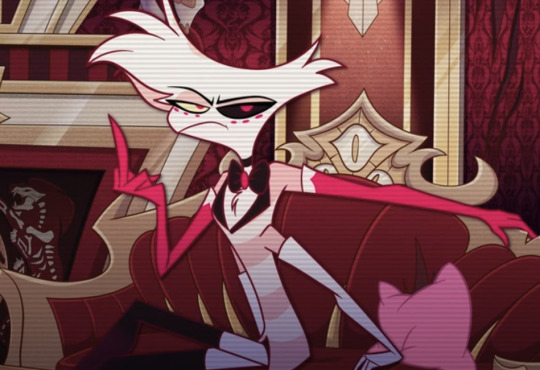
More specifically his constant usage of gloves/long sleeves/boots. We know he hates his spider feet, and yeah, the usage of gloves and his blazer can be to fit his style, but it’s also fun to think that maybe him wearing them is an active attempt to reduce sensory input? He’d still get some vibration input because the fabric won’t block everything, but it won’t be as direct. But since spider sensory organs aren’t localized like humans are, this could essentially be the equivalent of wearing a headphones. (Also do you really want to taste every single thing you touch?)
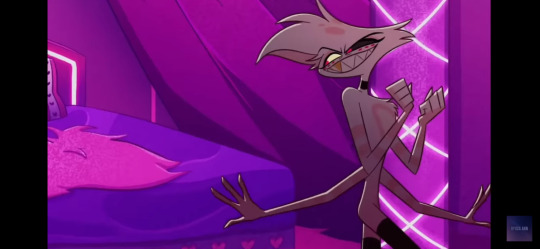
Which brings me to the second order of business: when he DOESNT wear his gloves. We do see him have to be bare for the camera, and if you consider him wearing clothes as a way of sensory modulation, he could essentially be forced to get all that input. Sensory overload would already be so ways in a place with so many sounds, lights, smells, etc. but imagine if you also have to do that when not used to such a level of exposure?
In humans there’s a condition called hyperacusis, which is basically a reduced pain and discomfort threshold to sounds. Some everyday ones can cause pain. Some neurodivergent people also have sensory sensitivities like that, in both cases sometimes headphones can help to reduce input.
The thing is though, if you constantly wear them you’re reducing your own threshold. It’s not recommended for people with hyperacusis to wear earplugs all the time because it makes them even more sensitive when not wearing them.
So, if you apply the same principle here, there is even more reason to consider the idea Angel would have some level of overstimulation just from not having his clothes on, combine that with the work environment, what he has to do, and the emotional turmoil of it all and that just makes it worse.
Which… with me anyways I’ve found when I’m too overloaded my brain tends to nope out and dissociate. So that could be what happens to Angel as well.
Then, there is one time outside of the studio we see him with uncovered arms and that’s the battle at the hotel.
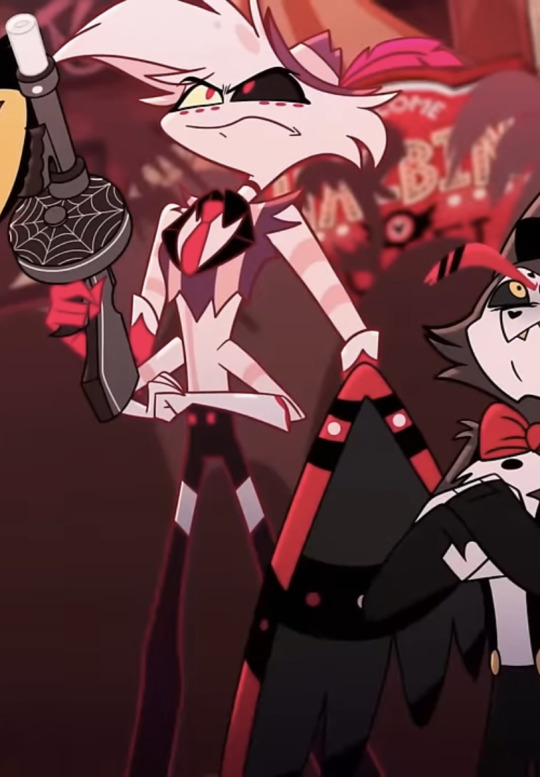
Here, he’s wearing gloves but his arms are exposed. So it could be said that he’s allowing himself access to more input while also not overwhelming himself. He still has a buffer with the gloves on, but he also has heightened awareness for things around him.
Again, the amount of this actually being applicable in canon is hard to say. Sense we don’t know how spidery Angel really is (since again, he does have a tongue) and what level of research went into that aspect of their character designs. But I think it’s a fun thing to consider.
So uhhh… yeah. Totally normal about this all as someone who totally isn’t interested in audiology, hyperfixating on hazbin hotel, and neurodivergent myself.
(Update: there is now a fic)
#I would like to state that this post is based on 2 am research of jumping spiders and spiders as a wholes sensory perception#so if there is any wrong information feel free to correct me#excuse me while I combine my special interests in a post#hazbin hotel#angel dust#angel dust hazbin hotel#hazbin hotel headcanon#hazbin hotel analysis#hazbin hotel meta
232 notes
·
View notes
Text
One of the more interesting aspects of Stayed Gone is the implication that, prior to his disappearance, Alastor must have been producing some quality programming.
Despite it's obvious importance in the modern world, TV apparently only started outcompeting radio in Hell after Alastor vanished. Seven whole years ago. And when Al returns, Vox's first response is to freak the fuck out about whether he's gonna keep his audience.
That's fucking crazy.
And we can be pretty sure that people weren't just listening in out of fear, either. Or because Alastor was making any major effort to crush all other forms of media.
If this was purely about which Overlord was the most powerful, then Vox's verses would surely have focused on emphasising his own strength. Instead, they're all about calling radio outdated. Vox is genuinely worried— apparently based on experience— that Alastor is going to outdo him in terms of sheer entertainment value.
Which raises the obvious question: what were Al's shows actually like? (Aside from those early broadcasts guest-starting the screams of the damned, obviously.)
We get kind of a taster in the song:
“Salutations! Good to be back on the air. Yes, I know it's been a while, since someone with style treated Hell to a broadcast— Sinners, rejoice!— instead of a clout-chasing mediocre video podcast. Is Vox insecure, pursuing allure? Fitting between this fad and that, is nothing working? Every day, he's got a new format! Is Vox as strong as he purports? Or is it based on his support? He'd be powerless without the other Vees! And here's the sugar on the cream: he asked me to join his team! I said no, and now he's pissy, that's the tea!”
Obviously he's doing it to music, so there's going to be some difference in the cadence of his voice from that, but still, he's talking noticeably quicker than he does in person. And he gets right to the point.
Compare it to his commercial in episode 1. There's a big difference in terms of both how much respect he's showing his audience (“well hello there, you wayward sinner!” vs “good to be back on the air”), and how much relevant information he delivers.
Alastor is a great character to watch, but most people who interact with him directly seem to find the experience either annoying, awkward, terrifying or all three.
Mainly because Al seems to go out of his way to put people off even when he's actively trying to get them to trust him, by making condescending asides or constantly dropping references to his own power. On air, however, he greets everyone politely and even drops what is almost an apology for being gone so long (“I know it's been a while”), then immediately gets to the information that he knows they're really listening for.
Alastor may not respect Charlie, Adam or Lucifer, but he does respect his audience.
And the content he's producing makes it clear why people are still tuning in. Al has the gossip. Katie Killjoy and Tom Trench may not be unbiased exactly, but they're clearly trying to provide sources for their claims and maintain some veneer of professional news reporting.
Al, meanwhile, is quite happy to provide strong opinions and baseless speculation about public figures, content that is less fitting with the professional image that Vox seems so desperate to keep up, but that is likely to attract a bigger audience.
What gets me curious now, however, is wondering what else he used to provide.
Again, radio was apparently the medium for news and entertainment in Hell until Alastor left. Implying that a) radio was at the time fulfilling many of the function that TV now provides, and b) Alastor was involved enough in this that it collapsed/got overthrown the moment he left town.
Did Alastor have an empire similar to the Vees? Did he run a bunch of channels? Did he have DJs and sports commentators and presenters on his payroll?
Given that radio seems to have collapsed completely after he left— did they all go running to Vox when he was presumed dead? Was the Vees new empire in part built on the ruins of Alastor's old one?
Or did he do the whole thing solo and just run like, a bunch of different shows. (In which case, since radio's bread and butter has always been music, Helluva Boss fans can now have fun imagining him interviewing Verosika Mayday about ‘Vacay to Bonetown’.)
#hazbin hotel#hazbin hotel meta#hazbin spoilers#alastor hazbin#vox#stayed gone#meta#hazbin hotel headcanons#i'm writing this right before bed so excuse if it seems a bit disjointed#🥱
172 notes
·
View notes
Note
Hi! Do you think Alastor and Lucifer are foils?
Hi!
Yes, of course they are!

Alastor and Lucifer's foiling starts in Dad Beats Dad (obviously), where they fight over Charlie's affection. They might seem as opposites throughout the episode, but they are actually the same, as they both try to impress Charlie with their powers:
[ALASTOR:]
They say, when you're looking for assistance
It's smart to pick the path of least resistance
[LUCIFER:]
Others say, that in your needy hour
There's no substitute for pure angelic power!
Still, Charlie doesn't care and all she wants is for her parental figures to support her:
Charlie: How come he can have faith in me, but my own father can't?
In short, Alastor and Lucifer find pride in their abilities, but need to let go of it, in order to show their love for Charlie. By the end of the episode, they both accomplish this. However, they succeed in slightly different ways, that fit their shared motif of shadow and light. In particular:
Alastor is linked to shadows, as his abilities let him manipulate shadows
Lucifer is linked to light, as his name means morningstar and his powers manifest in light-beams
As a result:
Alastor's development happens in the shadows, whereas Lucifer's in the light - This is true also on a meta-level, as Alastor's arc is the secondary plot-line of the episode, whereas Lucifer's is the main one
Alastor acts as Lucifer's jungian shadow and becomes a catalyst for him to change. Similarly, Alastor himself is challenged to grow by his own jungian shadow, aka Husk
What is the jungian shadow? It is the repressed part of a person. In stories, a character might meet another one, who embodies this hidden part of the self. By integrating with the shadow, the character evolves. In other words, Alastor represents a repressed part of Lucifer and Husk a repressed part of Alastor. Let's see how it all plays out.
ALASTOR, HUSK AND MIMZY
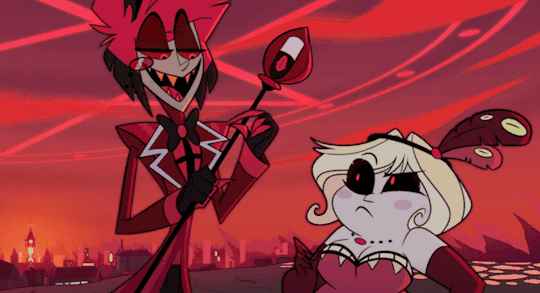
Alastor and Mimzy's bond is unhealthy, as they both enable negative sides of the other. On the one hand Alastor keeps covering for Mimzy, no matter what she does. On the other hand Mimzy feeds Alastor's ego by praising his power and abilities.
So, Mimzy never faces the consequences of her actions:
Mimzy: Thanks for helpin' lil' old me out of a though spot. You're always such a pal.
And Alastor feels respected and appreciated:
Alastor: It's nothing I can't handle. Don't worry Husker. Who in their right mind would cross me?
However, the reality is that Mimzy is using Alastor and Husk points this out:
Husk: You and I both know Mimzy only shows up, when she needs something. That bitch is trouble and who knows what kinda demon she fucked with to come running to you this time?
Not only that, but he openly calls Alastor out on his pride:
Husk: Big talk for someone, who's also on a leash.
Which results in Alastor reacting in anger:

That said, Husk is proven right. It turns out Mimzy has willingly brought chaos to the hotel, so that Alastor could solve things for her. Because of this, Alastor finally cuts ties with her:
Alastor: You deliberately brought danger to this place just to have me clean up your mess. I can't have that here.
This choice is important and it shows how the people around him are slowly impacting Alastor. On the one hand the Radio Demon listens to one of his subjects' advice. On the other hand he acts to protect the hotel. As a matter of fact the moment Alastor steps up as the Host of the Hotel isn't when he sings to Charlie in Hell's Greatest Dad nor when he transforms into a giant and fights. It is when he sends Mimzy away and sacrifices a little bit of his pride to do so. interestingly, this happens as nobody is looking at him, so he isn't really trying to impress nor to trick the others. He acts selflessly in the shadows.
LUCIFER, ALASTOR AND CHARLIE

Lucifer and Charlie's bond is strained:
Charlie: We just have never been close. After he and mom split, he never really wanted to see me. He calls... sometimes, but only if he's bored or like, needs me to do something.
At the root of this conflict there is Lucifer's inability to show his daughter how much he cares. He struggles to express his feelings and hides them behind a prideful persona:
Charlie: I told you when you called me five months ago. Or did you not listen?
Lucifer: No, no, no, no. Just, you know, I just forgot. I've just been really busy, ya know with um... important things.
Instead of openly admitting his depression and sadness he prefers to look cold and uninterested. Even dismissive and condescending, like when he arrives at the Hazbin Hotel:
Lucifer: Wow, this place sure looks, uh... Uh-uh. Yeah. Uh-uh. It's got a lot of character!
Lucifer is initially too focused on what he cares about - meeting his daughter - rather than on what Charlie wants - for him to help her with the hotel. He happily hugs Charlie and then immediately moves on to pet Keekee, Razzle and Dazzle, who are his own creations. Only later he considers the welcome Charlie and the others have prepared for him. Even then, he still misses the point and tries to buy Charlie's love by showing off his magical powers:

Haha, looks like you could use some help
From the big boss of Hell himself
Except that what Charlie wants from him aren't champaigne fountains or caviar mountains, but an appointment with Heaven, which he negates her. Not only that, but instead of being honest about his fears, he deflects everything on Charlie herself, by dismissing her plan:
Lucifer: Alright, listen, I love that you want to see the best in people, but these sinners... You know, they're just the worst. I, I don't know how much you can realistically expect from them in Heaven.
Luckily, the Radio Demon is closeby, as he forces Lucifer to show his true self.
On the one hand Alastor brings out Lucifer's insecurity and fears:
I'm truly honored that we've built such a bond
You're like the child that I wish that I had
I care for you, just like a daughter I spawned
It's a little funny, you could almost call me dad
He juxtaposes moments of everyday life and affirmations of affection to Lucifer's materialistic and fancy promises. In this way Alastor highlights the faults of Lucifer, as a father. He points out that Lucifer is never there for Charlie.
On the other hand Alastor embodies the kind of sinner Lucifer despises:
Lucifer: Ya see? What I tell ya? Charlie, sinners are violent psychopaths, hell bent on causing as much pain and destruction as they can. There's really no point in trying.
And yet, such a violent psychopath is more willing to help Charlie than Lucifer himself:
Charlie: Dad, stop! He's defending this hotel. It may be a bit more sadistic than I'd hoped. But he's doing it for me!
This realization leads to a confrontation between father and daughter and to an admission on Lucifer's part:
Lucifer: I just don't want you to be crushed by them like... like I was.
The problem isn't Charlie, but Lucifer himself. It is not that Charlie's dream is silly, but that Lucifer's one has been destroyed. This revelation is important because Lucifer's mask comes off and he shows Charlie his weakest and most broken self. He swallows his pride and has Charlie see who her father really his. In all his mistakes and his hurt. And to his surprise Charlie accepts him. Not only that, but she admires him:
So in the end, it's the view I had of you
That showed me dreams can be worth fighting for
Symbolically the song More than Anything starts with Lucifer and Charlie in the shadows:
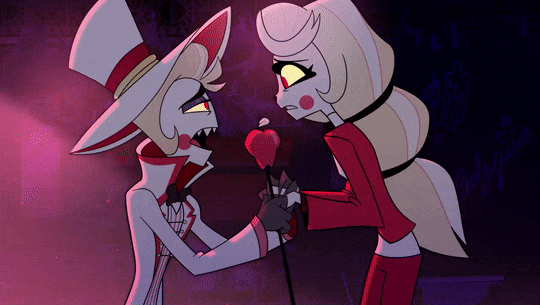
They are repressing a lot and have no idea who the other is. Still, as the song goes on, they get to understand each other:

All that I'm hopin', now that my eyes are open
Is that we can start again, not be pulled apart again
'Cause in the end, you are part of who I am
And they end the song surrounded by light:
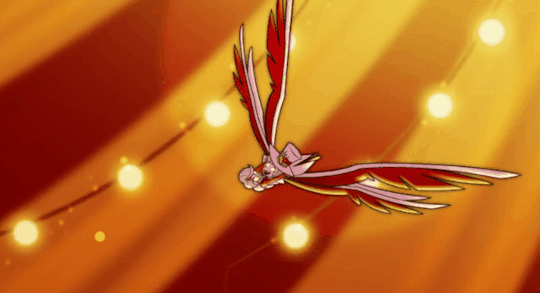
What is initially in the shadow comes to light in three different ways:
Lucifer shows Charlie his true self
Lucifer sees Charlie for who she is
Lucifer exhibits his weakness in front of the whole Hazbin Hotel. He lets the sinners he dislikes so much witness the mess that he is.
His fragility is in full display. It is in the light for everyone to see.
PHENOMENAL COSMIC POWERS! ITTY BITTY LIVING SPACE!

Another similarity Alastor and Lucifer share is that they are two powerful beings that give much importance to free will:
Alastor: You should know better than anyone what a soul can accomplish when they take charge of their own fate.
Charlie: Together, they wished to share the magic of free will with humanity.
And yet, they are both trapped:
Alastor: I'm hungry for freedom like never before
The constraints of my deal surely have a backdoor
Once I figure out how to unclip my wings
Guess who will be pulling all the strings?
Charlie: As punishment for their reckless act, Heaven cast Lucifer and his love into the dark pit he had created, never allowing him to see the good that came from humanity, only the cruel and the wicked.
On the one hand Alastor controls many souls, but his own is owned by someone else. On the other hand Lucifer is the strongest being in all of Hell, but he is regarded as a disgrace by other angels.
Moreover, they both project their unhappiness on others. Specifically, Lucifer blames sinners like Alastor:
Lucifer: Our "people", Charlie, are awful! They got gifted free will and look what they did with it! Everything's terrible!
While Alastor lashes out on his prisoners, like Husk:
Alastor: If you ever say that again, I will tear your soul apart and broadcast your screams for every other disrespectful wretch who dares to question me.
Still, the point is that Lucifer is exactly like Alastor. He is a gifted creature, who messed up royally and cursed humanity. Alastor instead is exactly like Husk, a powerful overlord, who still finds himself chained. Lucifer is the most hated being in all of creation and Alastor is on a leash. They are both lonely and desperate, but too proud to admit it. In other words, they are both losers:
Husk: There was a time I thought no one could relate
To the gruesome ways in which I'm damaged
But lettin' walls down, it can sometimes set you straight!
We're all livin' in the same shit-sandwich
Just like everyone in Hell. And yet, this is not bad per se. Even if you hit rock bottom, you can still climb back up, as long as you let go of self-importance and start to earnestly empathize with others. As a matter of fact it is only through community and bonds that a person can be redeemed and heal:
Out for love
Love
Think of who you care about
Protect them and be out
For love
Love
You're gonna fight without gloves
Long as you're out for love
This is what Alastor and Lucifer are learning through Charlie.
TWO DADS, ONE DAUGHTER

Season 1 sets up Alastor and Lucifer as two mentor figures to Charlie. They share this role in a way, which makes them almost perfect mirrors. Some examples:
Lucifer gives Charlie the hotel building and Alastor calls it Hazbin Hotel
Alastor helps repair the Hotel in the beginning, while Lucifer assists Charlie in building it anew by the end
Lucifer guides Charlie to Heaven, as he sets up her meeting with Sera and Emily. Alastor instead guides Charlie in Hell as he introduces her to Rosie and helps her inspire the cannibals
Both Alastor and Lucifer believe in Charlie, when she is at her lowest. Alastor does so before the final battle, whereas Lucifer after the fight
Alastor and Lucifer fight Adam (another foil of theirs) in the final episode. Moreover, both belittle his abilities and highlight how he is strong, but unskilled:
Alastor: You lack discipline, control and worst, you are sloppy!
Lucifer: So, this is what you've been up to since Eden? Gotta say, you really let yourself go buddy.
In particular, Alastor is the one supposed to take Adam down, but fails and Lucifer steps in by the end. This is just like in the beginning Lucifer is supposed to support and help Charlie with her project. Still, he is absent and Alastor fills the spot.
In other words, Alastor and Lucifer are unwillingly complementary and so far one has appeared when the other has been incapacitated. We'll see if this pattern continues. As for now, they are clearly framed as key to Charlie's development, so it is possible they will come to embody different sides of her:
Alastor represents the sinners Charlie wants to reach and all their pain and complexity. He is also linked to fear and the unknown. He is the ally she finds by herself. He is the found family Charlie chooses.
Lucifer represents the angels Charlie wants to communicate with. He is also linked to dreams and ideals. He is the legacy she inherits. He is the biological family Charlie wants to re-connect with.
In short, they are both parts of who Charlie is and she needs them to grow into herself. Just like they need her to mature and find redemption and happiness.
#hazbin hotel#hazbin hotel meta#alastor#alastor hazbin hotel#lucifer morningstar#lucifer hazbin hotel#my meta#asksfullofsugar#anonymous
204 notes
·
View notes
Text
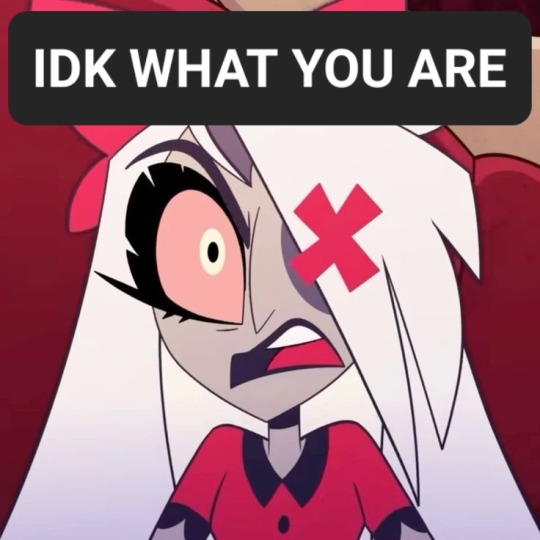
No seriously WHAT IS VAGGIE. Girl you are not beating the fallen angel allegations
#vaggie#hazbin hotel#hazbin hotel theory#hazbin hotel vaggie#hazbin hotel spoilers#hazbin#hazbin hotel meta#hazbin hotel charlie#chaggie
279 notes
·
View notes